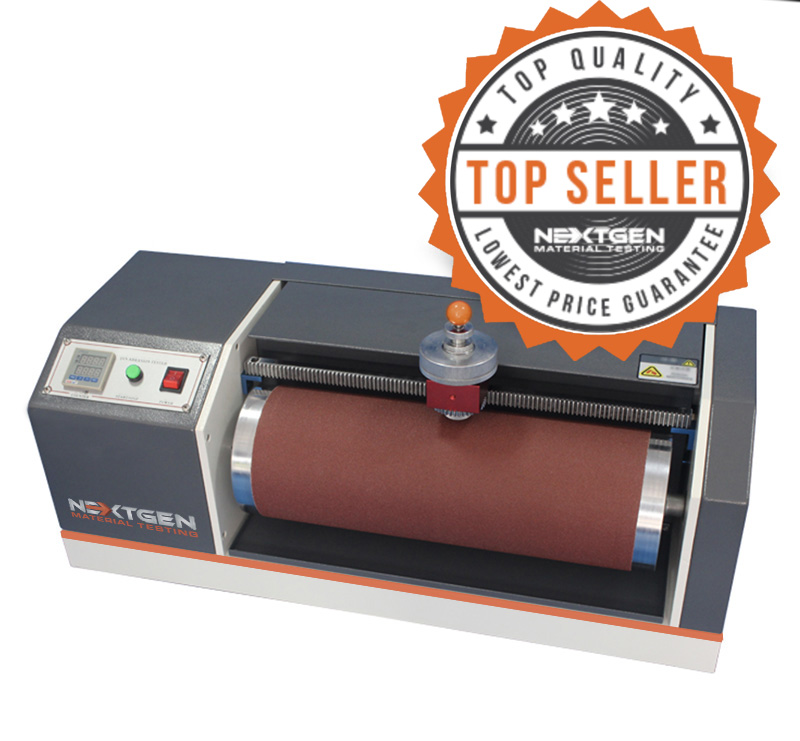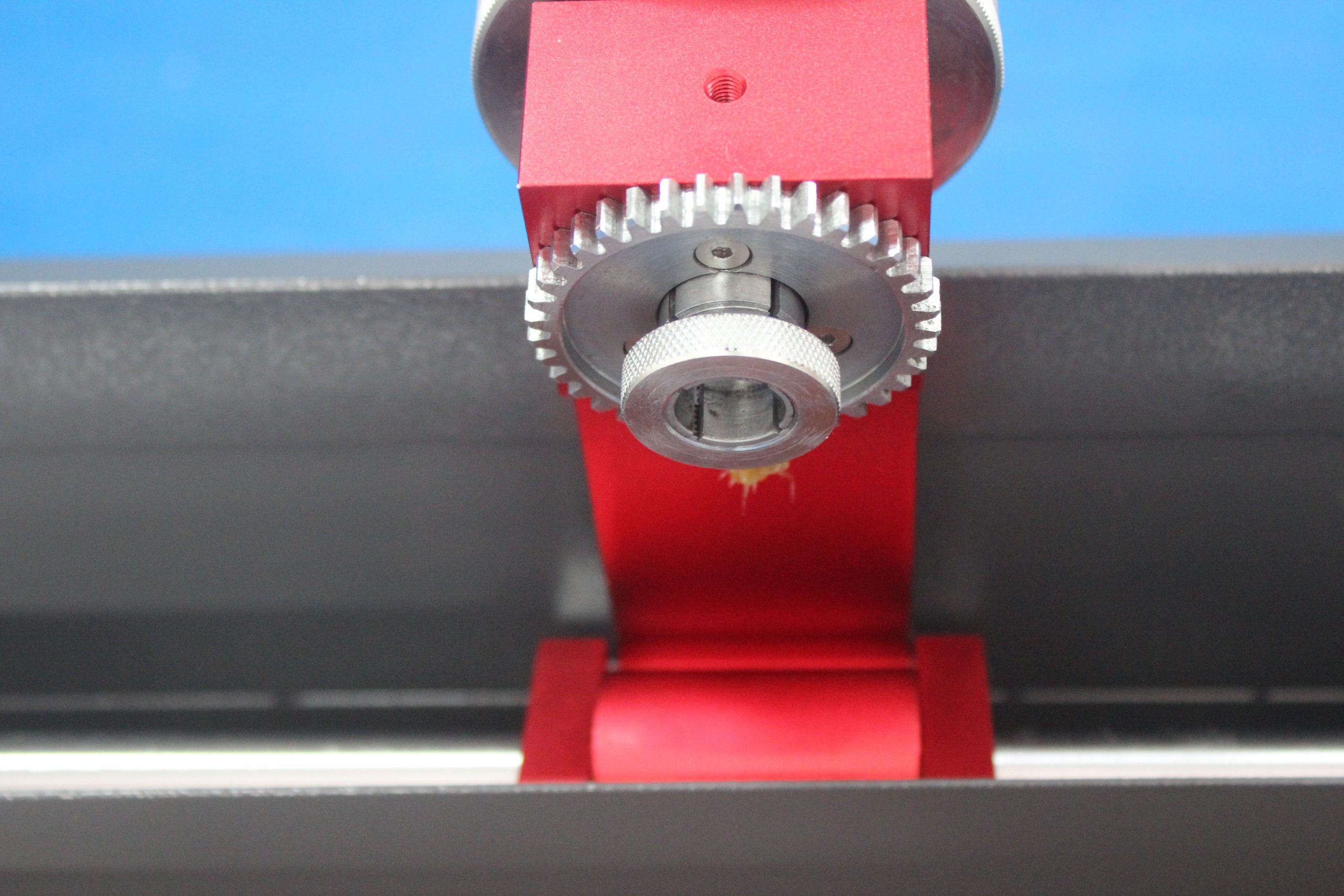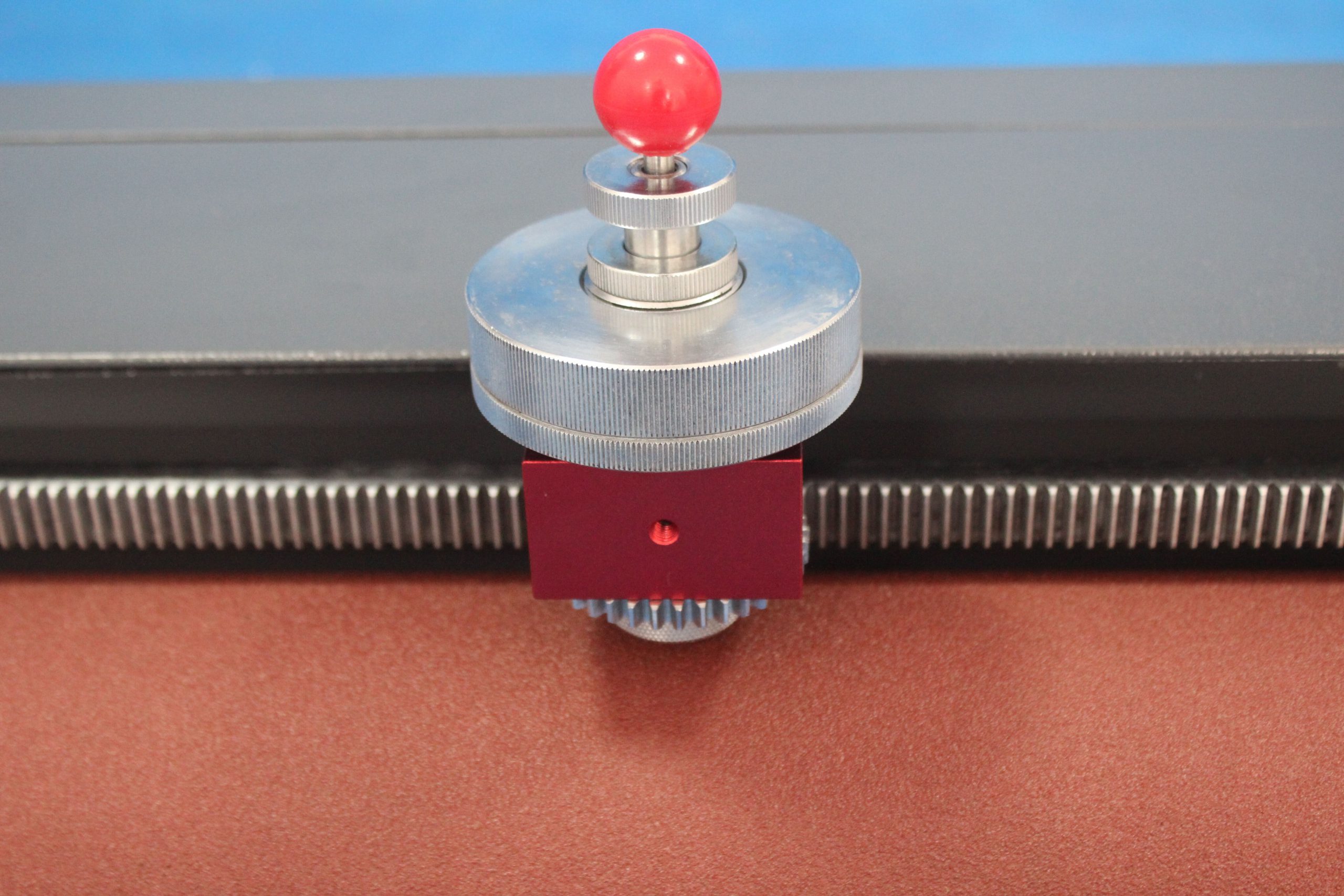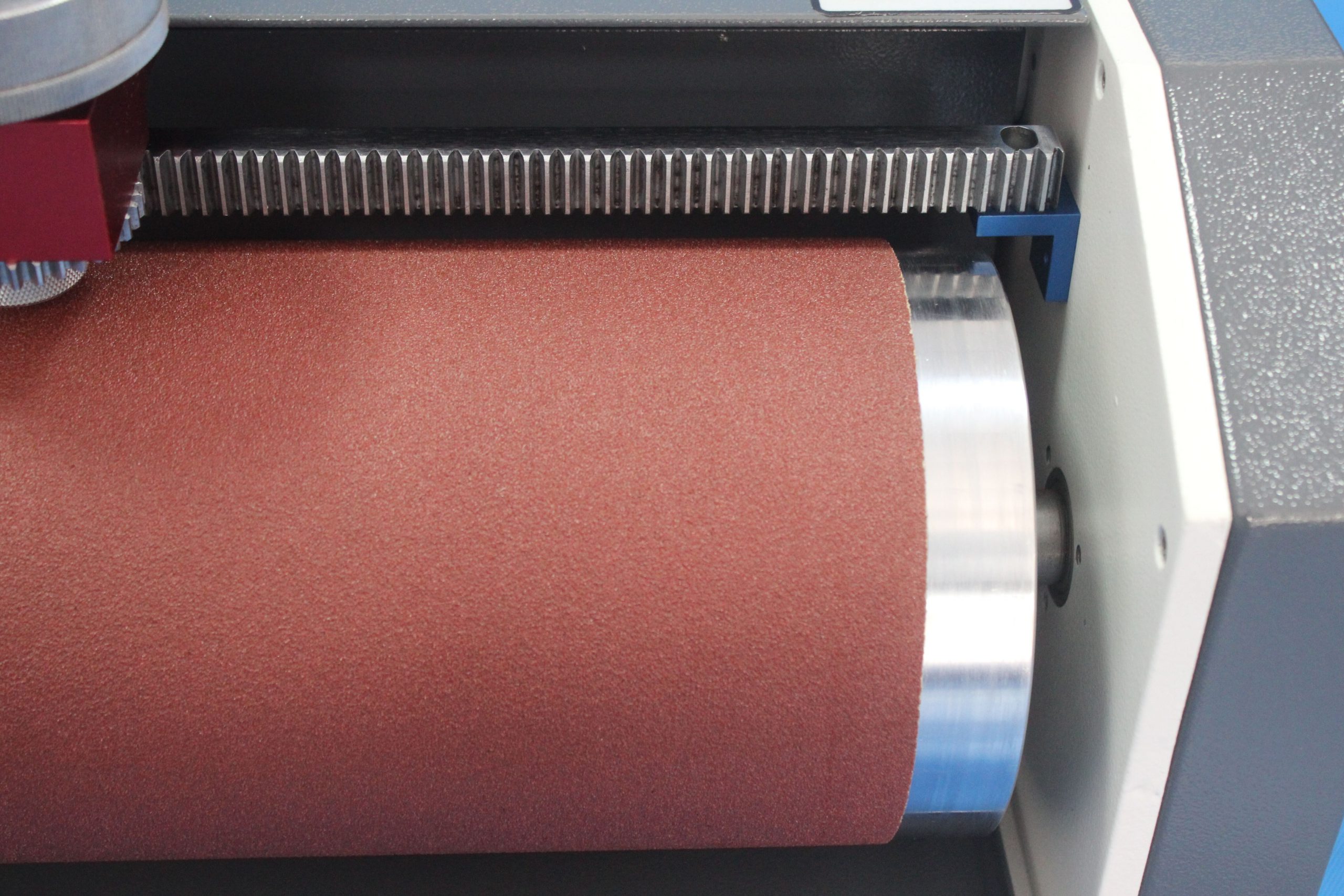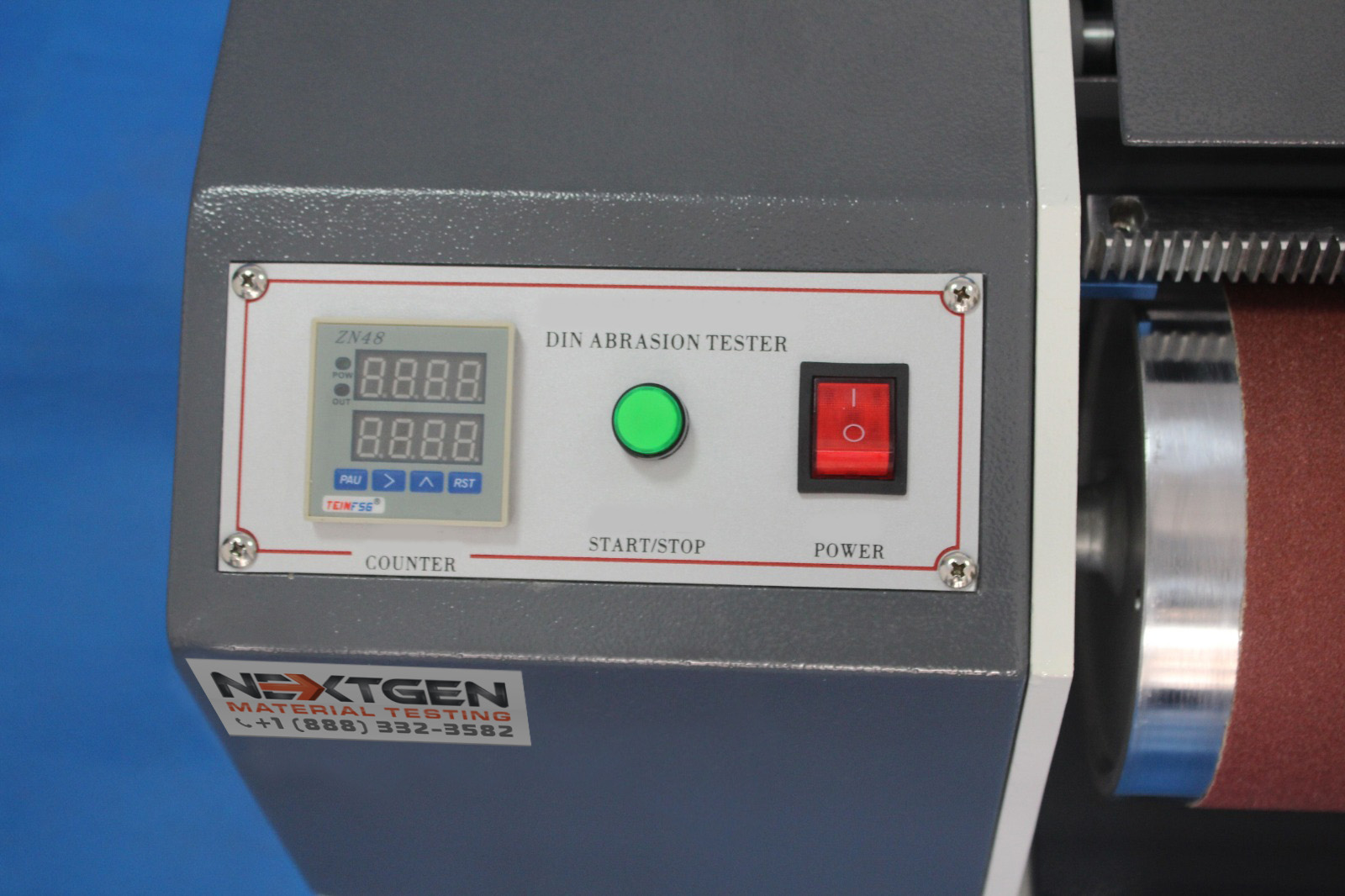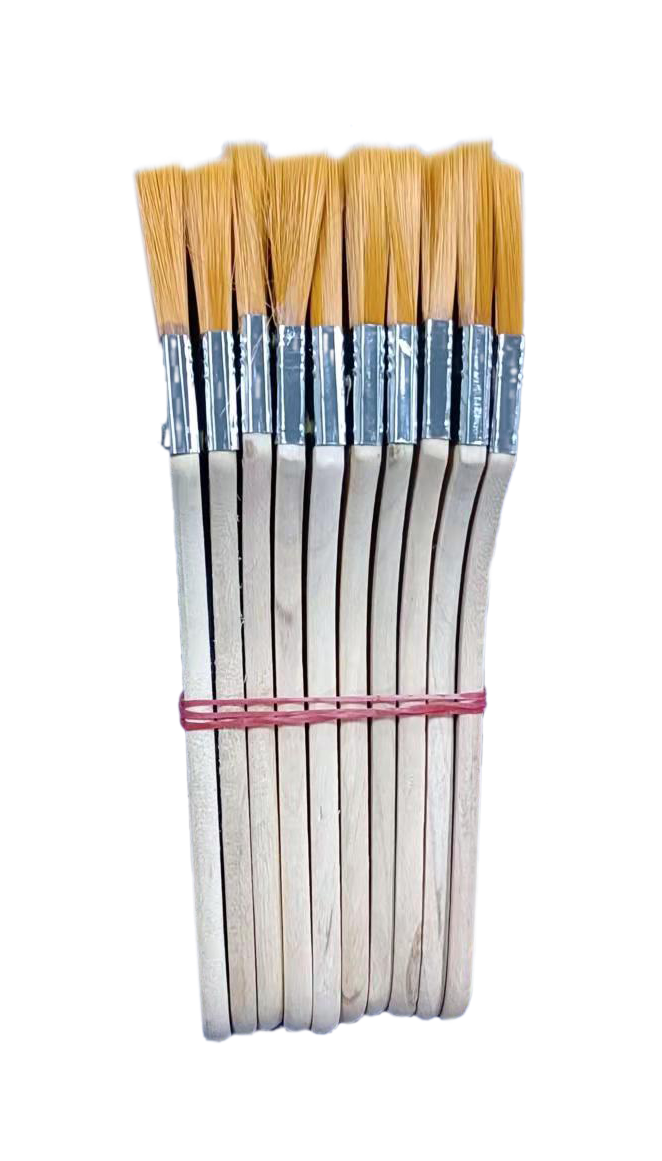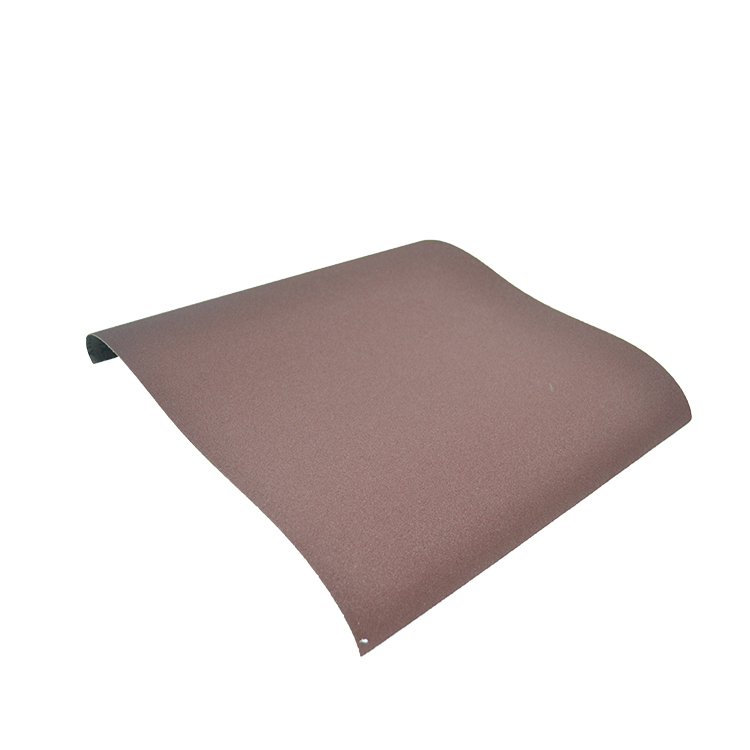Rubber Testing Equipment
Standards
ASTM D5963, EN ISO 20344, ISO 4649, DIN 53516, SATRA METHOD 174






Certified DIN Abrasion Tester
GenDin is designed to conform to the ASTM, EN, IS0 and DIN standards. This top quality and highly popular abrasion tester will allow you to measure the abrasion resistance of rubbers (vulcanized thermo set rubbers and thermoplastic elastomers) that are subject to abrasive/frictional wear on their actual service. Since wear is always a result of abrasion, different test methods have been developed for the simulation of long-term wear.
DIN Abrasion Testing Operation
DIN Method according to ISO 4649 Method 1 (without specimen rotation)
Certified DIN Abrasion Tester Supplier
The method conforming to ASTM D5963 / ISO 4649 has proven to be the best way of simulating long term wear. This method enables comparative tests for the control of the uniformity of a specific material. The achieved test results provide important parameters with respect to the wear of elastomers in practical use. The abrasion resistance is measured by moving a test piece across the surface of an abrasive sheet mounted to a revolving drum, and is expressed as volume loss in cubic millimeters or abrasion resistance index in a percentage. Learn more about the significance of DIN Abrasion Testing.



Specifications
| Model | GenDIN |
|---|---|
| Load | 2.5±0.1N; 5±0.1N; 10.0±0.2N |
| Specimen Size | Diameter 16mm, thickness 6-16mm |
| Rotating Drum Diameter | 150mm |
| Rotating Drum Speed | 40 ±1RPM |
| Emery Cloth Specification | 60 #, 425 ±473 ±1.5 (mm) |
| Testing Length | 40M (about 84 rotations) |
| Horizontal Displacement | 4.2mm / rotation |
| Test-Arm Weight | 250 ± 5 (g) |
| Shift Screw | 6 teeth / inch |
| Limit Rotation | 85 rotations |
| Set Rotation | 84 Rotations (about 40M) |
| Return Form | Automatic Electric Reset |
| Power | 110V/60Hz or 220V/50Hz |
| Machine Dimensions (W x D x H) | 70 x 30 x 30 (cm) 27.55 x 11.80 x 11.80 – inches |
| Machine Weight | 61 kg / 134 lbs |
DIN Abrasion Tester Consumables
GenDIN can be purchased with a full scope of DIN Abrasion consumables for your current and long-term needs. The consumables include abrasive paper, circular cutting device, standard rubber slabs, additional 10N loading weights and more. You purchase your DIN consumables with or after the order of the main instrument. Additionally, NextGen often offers special consumables bonus incentives. Ask us for our best consumables offer by request quotation today.
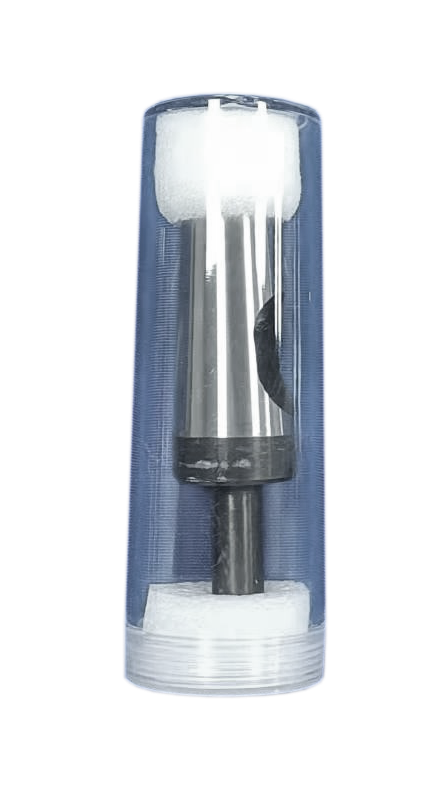




FAQs
The primary purpose of the GenDin - DIN Abrasion Tester is to measure the abrasion resistance of rubber and elastomer materials. This instrument simulates materials' wear and tear during actual use, providing precise data on their durability. Industries such as automotive, footwear, and industrial manufacturing rely on this tester to verify that their materials can withstand prolonged exposure to friction and wear.
By using the GenDin tester, manufacturers can assess the lifespan of materials, ensuring that their products meet the necessary quality and safety standards. The data obtained is crucial for material selection and product development, helping companies choose the most durable materials for their specific applications. This ultimately leads to the production of high-quality products that can endure daily use.
Click here to learn more about the product or here to receive a personalized quote.
The GenDin - DIN Abrasion Tester meets several key international standards, including ASTM, EN, ISO, and DIN. These standards are necessary for verifying that GenDin's abrasion resistance testing is accurate, consistent, and globally recognized. ASTM (American Society for Testing and Materials) sets technical standards for an array of materials, while ISO (International Organization for Standardization) and EN (European Norms) are globally acknowledged frameworks that define quality and safety benchmarks. DIN (Deutsches Institut für Normung) is the German national standardization organization.
Compliance with these standards guarantees that the GenDin tester delivers reliable results across various industries such as automotive, footwear, and industrial manufacturing. This allows manufacturers to meet international quality and safety requirements, making them durable and fit for their intended applications. As a result of compliance with these standards, test results are also more credible and accepted throughout the world.
Click here to learn more about the product or here to receive a personalized quote.
The GenDin - DIN Abrasion Tester is designed to evaluate the abrasion resistance of a variety of rubber and elastomer materials. These materials include vulcanized thermoset rubbers and thermoplastic elastomers, which are commonly used in industries like automotive, footwear, and industrial manufacturing. Specific examples of materials tested by GenDin include rubber compounds used in the production of tires, conveyor belts, footwear soles, seals, gaskets, and other products that require high durability and resistance to wear.
The ability to test these materials is crucial for guaranteeing that they can withstand their intended applications. The data obtained from these tests helps manufacturers select the appropriate materials for their products, making sure that they are durable, safe, and meet the necessary quality standards. This makes the GenDin tester a valuable tool for material selection and quality control in many industries.
Click here to learn more about the product or here to receive a personalized quote.
The GenDin - DIN Abrasion Tester offers a comprehensive range of consumables to support both immediate and long-term testing needs. These consumables include abrasive paper, which is necessary for creating wear surfaces in tests. They also include a circular cutting device for precise sample preparation, standard rubber slabs used as reference materials, and additional 10N loading weights to adjust the pressure during tests. These items provide abrasion testing accuracy and reliability.
You can purchase these consumables at the time of ordering the main instrument or later as required. Additionally, NextGen frequently provides special offers on consumables, making it advantageous to inquire about their latest deals when requesting a quotation. This flexibility allows users to maintain their testing equipment in optimal condition, resulting in consistent performance and reliable test results over time.
Click here to learn more about the product or here to receive a personalized quote.
The GenDin - DIN Abrasion Tester is a certified testing instrument that conforms to internationally recognized standards such as ASTM D5963 and ISO 4649. These standards are considered the most reliable methods for simulating long-term wear in rubber and elastomer materials. The GenDin tester allows for comparative tests that control the uniformity of specific materials by measuring their abrasion resistance.
The testing process involves moving a sample across an abrasive sheet mounted on a revolving drum, with results expressed as volume loss in cubic millimeters or as an abrasion resistance index in percentage. These measurements provide essential data on how materials will perform under practical, everyday use. GenDin's conformity to these stringent standards ensures accurate, repeatable results, making it a trusted tool for industries that require high-quality material testing.
Click here to learn more about the product or here to receive a personalized quote.
Yes, the GenDin - DIN Abrasion Tester is fully compliant with the ASTM D5963 standard. This is a crucial method for determining the abrasion resistance of rubber materials, including vulcanized thermoset rubbers and thermoplastic elastomers. ASTM D5963 outlines a specific procedure where a rubber specimen is moved over an abrasive surface on a rotating drum. This process measures the material's wear resistance, providing data in terms of volume loss in cubic millimeters or an abrasion resistance index expressed as a percentage.
Compliance with the ASTM D5963 standard makes certain that the GenDin tester provides accurate, reliable, and consistent results, which are essential in industries where rubber products undergo significant wear, such as tires, conveyor belts, and footwear manufacturing. This compliance not only guarantees that the materials meet industry standards but also helps manufacturers select the right materials for their products. This ensures durability and performance in real-world applications.
Click here to learn more about the product or here to receive a personalized quote.
Yes, the GenDin - DIN Abrasion Tester complies with the EN ISO 20344 standard, which specifies testing methods for safety footwear materials. This standard is essential for assessing rubber components' abrasion resistance. The abrasion test evaluates how well these materials withstand wear over time, a critical factor in determining footwear durability and safety.
The GenDin tester performs these tests in an accurate and consistent manner, providing manufacturers with reliable information that they can use to ensure that their products meet the requirements for the protection and durability of the industry as a whole. As a result of complying with EN ISO 20344, it is ensured that the materials tested meet the necessary performance criteria, which is essential for maintaining safety and longevity in environments with demanding conditions.
Click here to learn more about the product or here to receive a personalized quote.
Yes, the GenDin - DIN Abrasion Tester complies with the ISO 4649 standard, which is a globally recognized method for determining the abrasion resistance of rubber, both vulcanized and thermoplastic. ISO 4649 outlines the procedures for evaluating how rubber materials perform under abrasive conditions. This is a key factor in assessing their durability in real-world applications.
The test involves pressing a rubber specimen against an abrasive sheet mounted on a rotating drum. Wear is measured by the material's volume loss or an abrasion resistance index. The GenDin tester's compliance with ISO 4649 provides consistent, accurate, and comparable results across different tests and materials.
This compliance is crucial for manufacturers in industries such as automotive, footwear, and industrial goods, where material durability is critical. By meeting ISO 4649 standards, the GenDin tester provides reliable data that helps in the selection of materials for products that need to withstand significant wear.
Click here to learn more about the product or here to receive a personalized quote.
Yes, the GenDin - DIN Abrasion Tester complies with the DIN 53516 standard, which is a German standard for determining rubber materials' abrasion resistance. DIN 53516 specifies the method for testing how much material is lost when a rubber specimen is subjected to abrasive wear. The test involves pressing the rubber sample against an abrasive surface on a rotating drum. It also measures the volume loss after a set distance.
Compliance with DIN 53516 is crucial in industries where rubber components are exposed to significant wear, such as tires, seals, and conveyor belts. The GenDin tester’s adherence to this standard provides accuracy and reliability of abrasion resistance tests. This makes it an essential tool for manufacturers who need to ensure that their rubber products meet the required durability and performance standards under abrasive conditions.
Click here to learn more about the product or here to receive a personalized quote.
Yes, the GenDin - DIN Abrasion Tester complies with SATRA TM174. SATRA TM174 is a widely used standard for assessing materials' abrasion resistance, particularly in the footwear industry. This method involves determining how much material is lost when a specimen is subjected to abrasive conditions, simulating the wear materials experience during actual use.
The SATRA TM174 method is particularly helpful for evaluating the durability of footwear materials, such as rubber soles. The GenDin tester, using this method, ensures that abrasion resistance tests are accurate and relevant to real-world applications. By complying with SATRA TM174, the GenDin tester provides reliable data that helps manufacturers select the right materials to ensure their products meet the necessary durability and performance standards, particularly in demanding environments like safety and sports footwear.
Click here to learn more about the product or here to receive a personalized quote.
The GenDin - DIN Abrasion Tester is equipped with precise load settings to provide accurate and consistent abrasion resistance testing of rubber and elastomer materials. The available load settings are 2.5±0.1N, 5±0.1N, and 10.0±0.2N. These settings allow for the controlled application of force on the test specimen during the abrasion process.
These specific load settings are crucial because they simulate different levels of wear and stress materials might encounter in real-world applications. By adjusting the load, the tester can mimic varying conditions of friction and pressure, helping manufacturers understand how their materials will perform under different levels of use. This is particularly important in industries like automotive, footwear, and industrial manufacturing, where materials need to be tested for durability under varying stress conditions.
Accurate load application ensures that the abrasion test results are reliable and relevant, providing valuable data that manufacturers use to select and develop materials that meet specific performance standards. This capability makes the GenDin tester a vital tool in quality control and product development.
Click here to learn more about the product or here to receive a personalized quote.
The GenDin - DIN Abrasion Tester requires test specimens to adhere to specific size dimensions to ensure accurate and consistent abrasion resistance testing. The standard specimen size for this tester is 16mm with thicknesses ranging from 6mm to 16mm. These dimensions are crucial because they align with the standardized requirements for abrasion testing, making sure the results are both reliable and comparable across different tests and materials.
Having a uniform specimen size allows the tester to apply the correct amount of force and abrasion pressure, which is essential for simulating real-world wear conditions. The controlled size helps manufacturers produce consistent data to evaluate the durability of rubber and elastomer materials, especially in industries where precise material performance is critical, such as automotive, footwear, and industrial applications.
Click here to learn more about the product or here to receive a personalized quote.
The GenDin - DIN Abrasion Tester features a rotating drum with a 150mm diameter. This specific drum size is integral to the standardized abrasion testing process. The 150mm diameter ensures that the abrasive surface interacts with the test specimen in a controlled and consistent manner, which is crucial for producing accurate and repeatable test results.
It is important to note that the drum's diameter directly impacts both the area in contact with the specimen and the nature of the abrasive action on the specimen, thereby simulating real-world wear conditions. With the use of a standardized drum size, the GenDin tester is able to provide reliable data on the wear resistance of rubber and elastomer materials, allowing manufacturers to evaluate the durability and performance of their products under expected use conditions.
Click here to learn more about the product or here to receive a personalized quote.
The GenDin - DIN Abrasion Tester operates at a rotating drum speed of 40 ±1 RPM (Revolutions Per Minute). This specific speed is critical for maintaining consistent and accurate abrasion testing results. The drum speed is carefully controlled to reflect rubber and elastomer materials' wear and tear under real-world conditions. The ±1 RPM tolerance makes sure that the drum's speed remains within a precise range, preventing variations that could affect test reliability.
The significance of this drum speed lies in its ability to replicate the conditions under which materials will be used, allowing for an accurate assessment of their abrasion resistance. Consistent speed is crucial for making certain that each test is comparable to others, whether conducted at different times or on different materials. This controlled environment is crucial for manufacturers who rely on the GenDin tester to provide reliable data on material durability, which is necessary for quality control and product development.
Click here to learn more about the product or here to receive a personalized quote.
The GenDin - DIN Abrasion Tester uses an emery cloth with specific characteristics that are necessary for standardized abrasion testing. The emery cloth has a grit size of 60#, which is coarse enough to simulate the abrasive wear that rubber and elastomer materials would encounter in practical applications. The physical dimensions of the emery cloth are also specified, with a width of 425 mm and a length of 473 ±1.5 mm. These dimensions guarantee that the abrasive surface covers the rotating drum uniformly, providing consistent and repeatable contact with the test specimen.
The specific grit size and dimensions of the emery cloth are crucial for maintaining the integrity of the abrasion test, making sure that the wear on the test specimen is uniform and accurately reflects real-world conditions. This standardization allows manufacturers to rely on the test results for evaluating the durability and wear resistance of their materials, which is vital in industries.
Click here to learn more about the product or here to receive a personalized quote.
The testing length for the GenDin - DIN Abrasion Tester is set at 40 meters, which typically corresponds to about 84 rotations of the rotating drum. This testing length is an important parameter in the abrasion resistance test. It determines the total distance over which the rubber or elastomer specimen is subjected to abrasive wear. By standardizing the testing length to 40 meters, the GenDin tester ensures that the wear on the specimen is consistent, allowing for accurate and repeatable measurements of material loss or abrasion resistance.
This standardized testing length is important because it reflects a controlled simulation of materials' wear in real-life applications. By maintaining a consistent length, the GenDin tester can provide reliable data that manufacturers use to assess materials' durability and performance. This information is critical for industries such as automotive, footwear, and industrial manufacturing.
Click here to learn more about the product or here to receive a personalized quote.
The GenDin - DIN Abrasion Tester features a horizontal displacement of 4.2mm per drum rotation. This displacement is a key factor in the abrasion testing process. It determines the lateral movement of the specimen across the abrasive surface during each drum rotation. The 4.2mm displacement guarantees that the test specimen experiences consistent and even wear across its surface.
The importance of this horizontal movement is that it simulates real-world conditions under which materials are subjected to direct friction as well as lateral forces that contribute to the overall wear and tear of the materials. By maintaining a precise horizontal displacement when conducting the abrasion test, the GenDin tester ensures that the test accurately reflects the durability and wear resistance of the material when it is used in practical applications in the field.
Click here to learn more about the product or here to receive a personalized quote.
The test-arm weight of the GenDin - DIN Abrasion Tester is 250 ± 5 grams. This weight is a crucial component in the abrasion testing process, as it directly influences the amount of force applied to the rubber or elastomer specimen during testing. The precise weight provides assurance that the specimen is subjected to consistent pressure as it moves across the abrasive surface.
In order to make sure that the results are comparable across different tests and materials, the test-arm weight has been calibrated specifically to meet standardized testing conditions, which is important for ensuring consistent results. This consistency is vital for manufacturers who rely on the GenDin tester to assess materials' durability and abrasion resistance. By maintaining a strict tolerance of ± 5 grams, the tester guarantees that the applied force remains within the acceptable range.
Click here to learn more about the product or here to receive a personalized quote.
The GenDin - DIN Abrasion Tester uses a shift screw with 6 teeth per inch. This shift screw plays a critical role in adjusting and controlling the movement of the test specimen during the abrasion process. The 6 teeth per inch configuration allows for precise and consistent control over the specimen's horizontal displacement.
This level of precision is important because it directly affects how evenly the abrasive force is applied across the specimen's surface during testing. By ensuring that the movement is controlled and consistent, the GenDin tester can accurately simulate real-world wear conditions, providing reliable data on the material’s durability and abrasion resistance. This is essential for industries such as automotive, footwear, and industrial manufacturing. Understanding the wear characteristics of materials is vital for quality control and product development.
Click here to learn more about the product or here to receive a personalized quote.
During the abrasion testing process, the GenDin - DIN Abrasion Tester is set to a limit of 85 rotations at a time. The purpose of this rotation limit is to define the specific number of drum rotations over which the test specimen is exposed to abrasive wear over the course of the test. For an accurate material loss measurement, it is imperative that the specimen undergoes a sufficient amount of wear during the 85 rotations, which correspond to a standardized testing distance.
It is essential to set a precise rotation limit in order to maintain consistency across different tests and achieve reliable and comparable results in all tests. By using this limit, the GenDin tester is capable of accurately simulating the material's wear conditions under actual conditions of use.
Click here to learn more about the product or here to receive a personalized quote.
The GenDin - DIN Abrasion Tester is set to perform 84 rotations, which corresponds to approximately 40 meters of testing length. This specific rotation setting is significant because it standardizes the distance over which the rubber or elastomer specimen is subjected to abrasive wear during the test. By maintaining this set rotation, the tester guarantees that the material undergoes consistent wear.
This setting is critical for making sure that testing conditions closely mimic real-world scenarios where materials experience continuous friction and wear. The 84 rotations provide a controlled environment that delivers reliable data on how the material will perform over time. There are many industries where manufacturers need to know about the durability of the materials used in order to verify the quality and longevity of their products.
Click here to learn more about the product or here to receive a personalized quote.
The GenDin - DIN Abrasion Tester is equipped with an automatic electric reset feature that significantly increases its usability. After completing a test cycle, such as the standard 84 rotations, the machine automatically resets itself. This automation removes the need for manual intervention, which saves time and reduces the risk of human error.
The automatic reset feature is particularly advantageous in settings where multiple tests are conducted in succession, as it will guarantee that the tester is always ready for the next cycle without delay. This consistency is vital for maintaining results accuracy, as it guarantees each test begins under identical conditions. For industries such as automotive, footwear, and industrial manufacturing, where precision and efficiency are critical, this feature contributes to smoother operations and more reliable data.
Click here to learn more about the product or here to receive a personalized quote.
It is possible to use the GenDin - DIN Abrasion Tester with two different power options: 110V/60Hz or 220V/50Hz. Having the ability to test at two different voltages is extremely important since it enables the tester to be used in different parts of the world. This is without additional power converters or modifications. In North America, the standard power supply is typically 110V/60Hz, while in many other parts of the world, including Europe and Asia, 220V/50Hz is more common.
This adaptability means that the GenDin tester can be seamlessly integrated into different laboratory environments globally, making it a flexible tool for international manufacturers and testing facilities. The ability to adapt to different power supplies without compromising performance is crucial for maintaining the tester's reliability and functionality, regardless of location.
Click here to learn more about the product or here to receive a personalized quote.
The GenDin - DIN Abrasion Tester has compact dimensions, measuring 70 cm in width, 30 cm in depth, and 30 cm in height, or 27.55 x 11.80 x 11.80 inches. These dimensions are important because they make the tester easy to accommodate in different laboratory settings, even where space is limited. The compact size allows the machine to fit on standard laboratory benches without occupying excessive space, which is a crucial consideration for labs that handle multiple pieces of equipment.
Additionally, the tester's manageable size facilitates easy transport and installation, making it an ideal option for facilities that need to relocate or reconfigure their lab layouts. Despite its compact form, the GenDin tester remains highly effective, offering reliable abrasion resistance testing while being space-efficient. This balance of size and functionality makes it an attractive choice for industries requiring precise and reliable material testing.
Click here to learn more about the product or here to receive a personalized quote.
The GenDin - DIN Abrasion Tester weighs 61 kg, or approximately 134 lbs. This weight is significant for several reasons. First, it maintains the machine's stability during operation, which is crucial for accuracy and consistency in abrasion testing. A stable, well-anchored machine minimizes vibrations and movements that could otherwise affect test results.
Additionally, the tester's weight is a practical consideration for laboratories in terms of installation and setup. While the machine is relatively heavy, it is still manageable for transport and placement in most laboratory environments. The weight also reflects the robust construction of the machine, designed to withstand rigorous use over time. This balance of stability and portability makes the GenDin tester a reliable and durable option for industries that require precise and consistent material testing.
Click here to learn more about the product or here to receive a personalized quote.
EN ISO 20344 and ISO 4649 are both important standards in material testing, but they serve different purposes and apply to different aspects of material performance.
EN ISO 20344 is a comprehensive standard that outlines test methods for footwear, particularly safety footwear. It covers a number of tests including abrasion resistance, slip resistance, and impact resistance, among others. The primary focus of EN ISO 20344 is to make sure that safety footwear meets the necessary performance requirements to protect the wearer in hazardous environments. It specifies the procedures for testing footwear materials, such as the soles, uppers, and linings, to ensure they meet stringent safety and durability criteria.
On the other hand, ISO 4649 focuses on determining rubber abrasion resistance, including vulcanized and thermoplastic materials. This standard is not limited to footwear but is used in many different industries to evaluate how rubber materials withstand wear when subjected to abrasive conditions. The ISO 4649 standard outlines methods for measuring rubber volume loss after being subjected to a rotating drum with an abrasive sheet.
Click here to learn more about the product or here to receive a personalized quote.
A wide variety of industries use DIN abrasion methods for testing their products. These include the following industries and sectors: leather, textile, clothing, automotive, rubber, aerospace, rubber rollers, bearings and seals, R & D facilities, and rubber and plastic manufacturers, among many others.
Typically, these industries break into sub-industries that range from small, medium, to large-sized companies. Many of them use the DIN abrasion testing methods on a consistent basis as part of their quality control measures.
Depending on the application, the results of DIN abrasion testing are quite useful. In particular these are beneficial to manufacturers and designers of rubber products. Rubber abrasion tests are good indicators of the performance and quality of the material.
For designers, the data culled from the results can provide much help in their research efforts. Likewise, they can use the information for checking for the efficiency of the product. On the other hand, manufacturers can make use of the results to help develop better and higher quality products. finally, end-users get the assurance that the products they will use are made from superior and high quality materials.
Three test pieces are cut from various positions of the material with a diameter of about 16 mm with a + or - 0.2 mm allowance and thickness of about 6.0 - 10 mm using a tubular drill.
The piece of test specimen must be parallel to the bottom and top. The round of flank must be vertical to either side, which is in the column's shape.
Note: if the test piece thickness is less than 6.0 mm, another rubber test piece with a hardness of 65 HA must be taken in a similar way, and sticks to the test piece using universal glue. This is to guarantee the thickness of a minimum of 6 mm.
The number of test pieces must be at least 3 pieces taken from each type of material. Instrumental correction: After testing for 10 times, the instrument must be corrected using a standard rubber. It should be done in accordance to the following:
First, a standard rubber must be tested for three times. Its mean is indicated as S. The results are correct when the standard rubber wear mean is around 200 + or - 20 mg. If the results read more than 220 mg, it means that the sandpaper is too sharp and it needs to be readjusted.
Put the iron of the same size as the test specimen, then rub the rubber until it becomes less than 220 mg in size. If it achieves a size of under 180 mg after wearing, the sandpaper needs to be replaced because apparently, it is a bit too blunt.
Note: if the wears in the test piece have a variance of over 15 mg, then the specimen must be abandoned, and retesting must be done.
In general, these two methods of abrasion testing require similar specifications for the DIN abrader. However, the most obvious difference between the two is that ISO 4649 cites two methods for abrasion test - rotating or non-rotating. On the other hand, DIN 53516 doesn't have any clear requirements for the same. But, the two standards are capable of determining abrasion resistance in rubber.
Based on industry standards, the ideal sandpaper for use on the rotary drum is around 60#. The abrasive is rather coarse, and will result to a high volumetric loss.
When looking at the results of abrasion tests, it is very important to remember one thing: the higher figures are indications of a greater surface rubber loss. The higher the figure, the bigger the loss. This means that resistance to abrasion is lower. On the other hand, a lower figure is an indication of better resistance to wear.
A single belt that has good abrasion resistance can usually perform much longer and more efficiently than say, 2 or even 3 "economy" belts of lower grade or quality.
Following is the detailed procedure for DIN abrader testing.
- First, the abrasion sheet's abrasiveness is determined. Once it is done, the device is now ready for testing. The test samples can be drilled easily on the rubber sheet or the final product using the circular cutting knife, which is optional. Usually, the tests are done at an ambient temperature of 230 C + or - 50 C with the option to heat the drum at a higher temperature.
- The test specimen's weight is initially measured.
- The sample is next mounted onto the sample holder. Set the preferred abrasion distance and apply the load weights. The cover of the instrument is then put in place. The testing procedure commences by simply clicking on the tester's start button.
The drum will then begin to rotate, and the test specimen will be sent over the abrasion sheet. The moment the pre-determined abrasion distance is hit, the instrument will automatically stop running. - At the conclusion of the test run, the sample is taken out of the sample holder, then the weight of the test sample after the abrasion process is measured.
- Calculate the abrasion. To do this, convert the mass loss (with average value of 3 - 10 individual values) into volume loss with the aid of the density and the correction done for the abrasion sheet's abrasiveness deviation from the given value of abrasiveness.
The following formula is used:
Abrasion = mass loss x abrasiveness x 200 specific weight
Rubber is a very elastic and versatile material. It is the material of choice in production verticals because of the different properties it has. The material is used to manufacture industrial products, domestic products, toys, and accessories, among others.
Rubber comes from the rubber plant. However, the rubber material taken from plants is quite soft by nature, and is not suitable for use in industrial applications. It cannot be molded into different shapes and sizes. The rubber material is hardened through the vulcanization process.
This is where abrasion testing comes in. The produced rubber material is tested to make sure it is durable enough for use as a material for manufacturing various products.
Abrasion testing is performed on materials that abrade or wear off over time. Some examples of these materials are belts, tires, shoe soles, and conveyor belts, among others.
In a DIN abrasion test, the specimen is secured into a sample holder (quick clamp), and then guided in a precise manner, with or without rotation, over a predetermined distance of either 20 m or 40 m. There is also a given load on a piece of abrasive paper that is mounted to a 150 mm diameter stainless steel rotary drum. The drum turns at a speed of around 40 rpm. Ultimately, the frictional loss is computed by comparing the weight of the test specimen before and after the test.
The rotary drum-type DIN abrasion tester performs test in compliance with DIN ISO 4649, D53516, ASTM D 5963, and AS1683.21.
Related Products
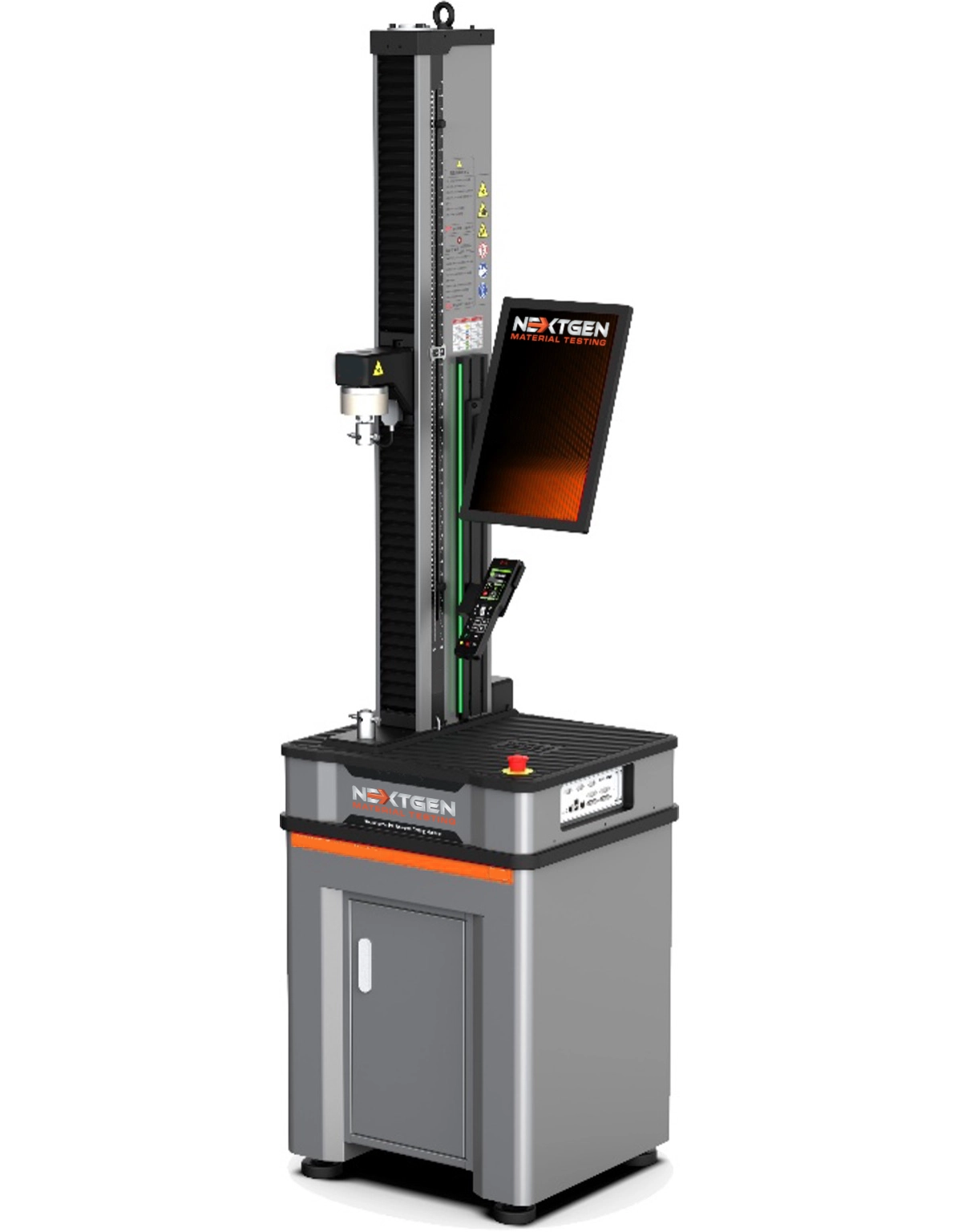
NG-EML Series A – Single Column Bench Top Universal Testing Machine (50 N – 5 kN)
The NG-EML Series A – Single Column Bench Top UTM (50 N–5 kN) is a precision electromechanical system designed for tension, compression, and flexural testing of low-force specimens. Featuring GenTest™ software, a high-speed servo drive, Class 0.5 accuracy, and USB/Ethernet control, this compact tabletop unit supports ASTM, ISO, and EN standards. Ideal for testing plastics, rubber, foams, films, composites, and thin metals.
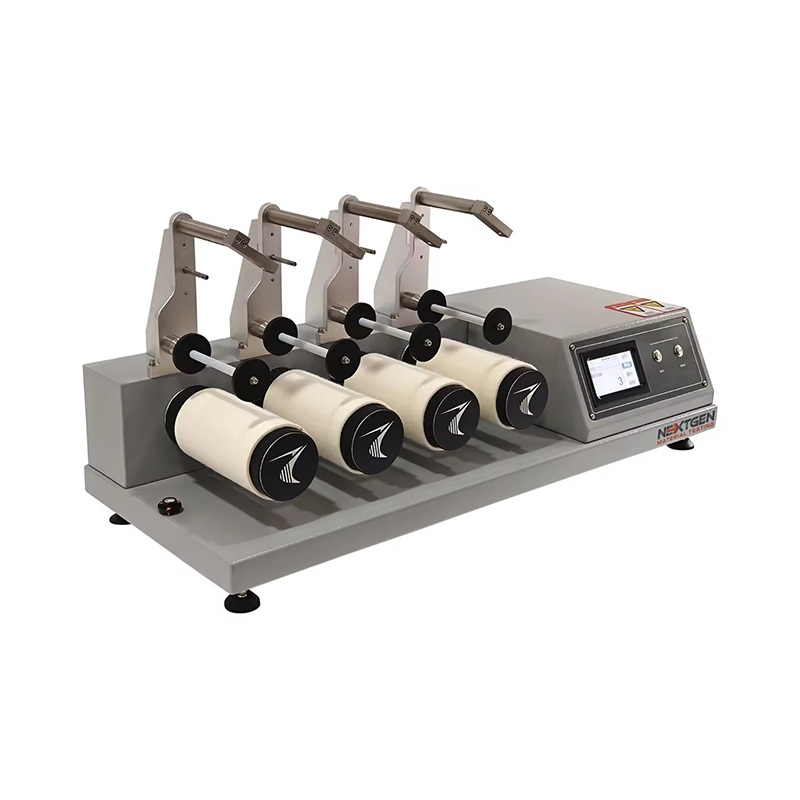
ICI / Mace Snag Tester
Discover the Fabric Textile ICI / Mace Snag Tester, a reliable tool for assessing fabric snagging under normal wear conditions.

Moving Die Rheometer (MDR)
Introducing the NG-MDR Moving Die Rheometer, your solution for accurately assessing the curing and processing characteristics of vulcanized rubber compounds. Designed for precision, this state-of-the-art rheometer captures the characteristic curve and parameters of rubber vulcanization by measuring the torque applied to the oscillating die.
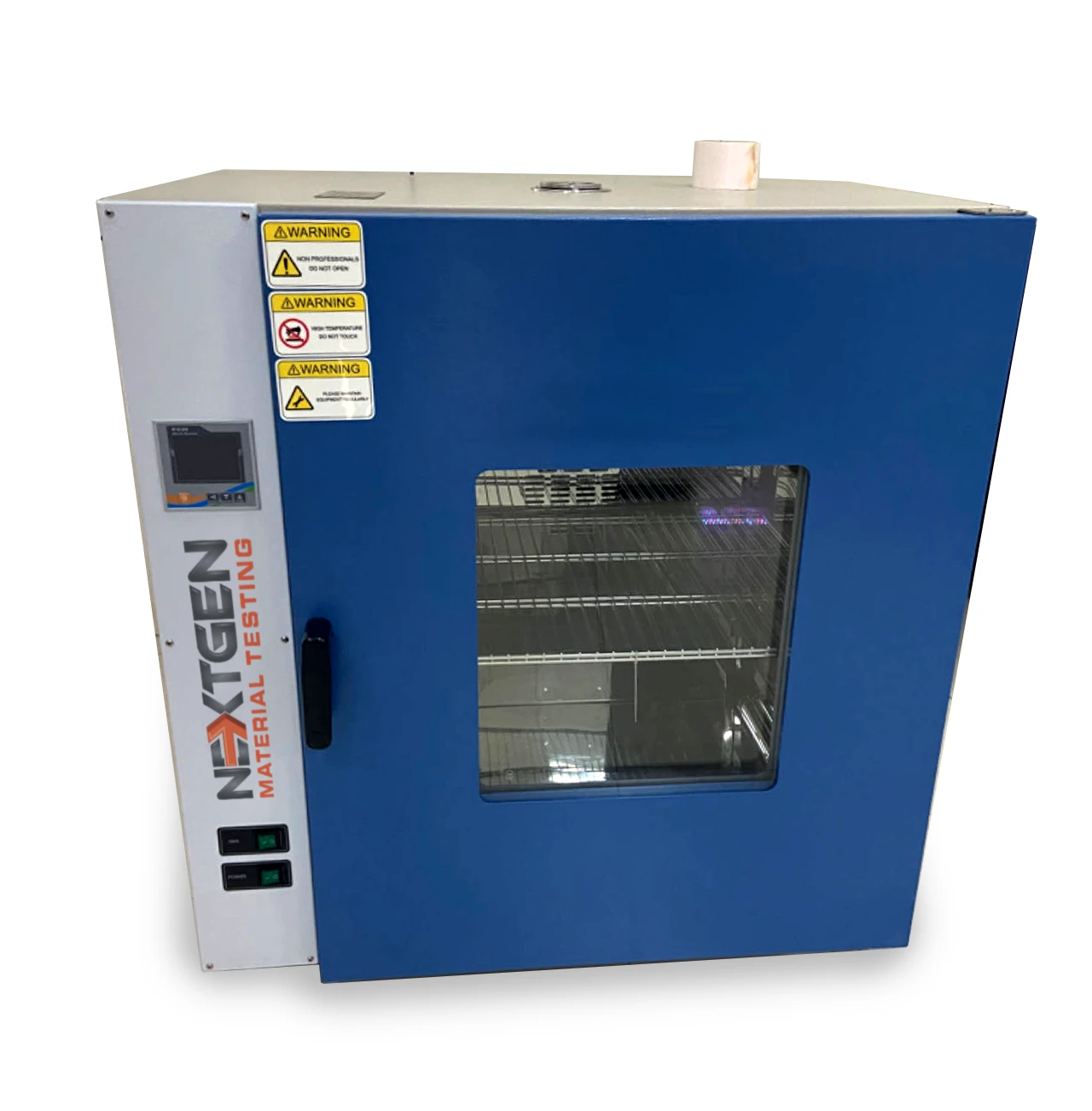
Aging Oven – High-Temperature Chamber – NG-AGOV-ADV
The NG-AGOV-ADV Aging Oven is designed for high-temperature testing of rubber, plastics, and insulating materials. It features programmable PID control, uniform airflow, and forced convection for stable and repeatable aging cycles. This system supports global testing standards including ISO 188, ASTM D573, and IEC 60216-4-1. With its durable stainless-steel chamber and user-friendly interface, it’s ideal for R&D, quality control, and certification labs.
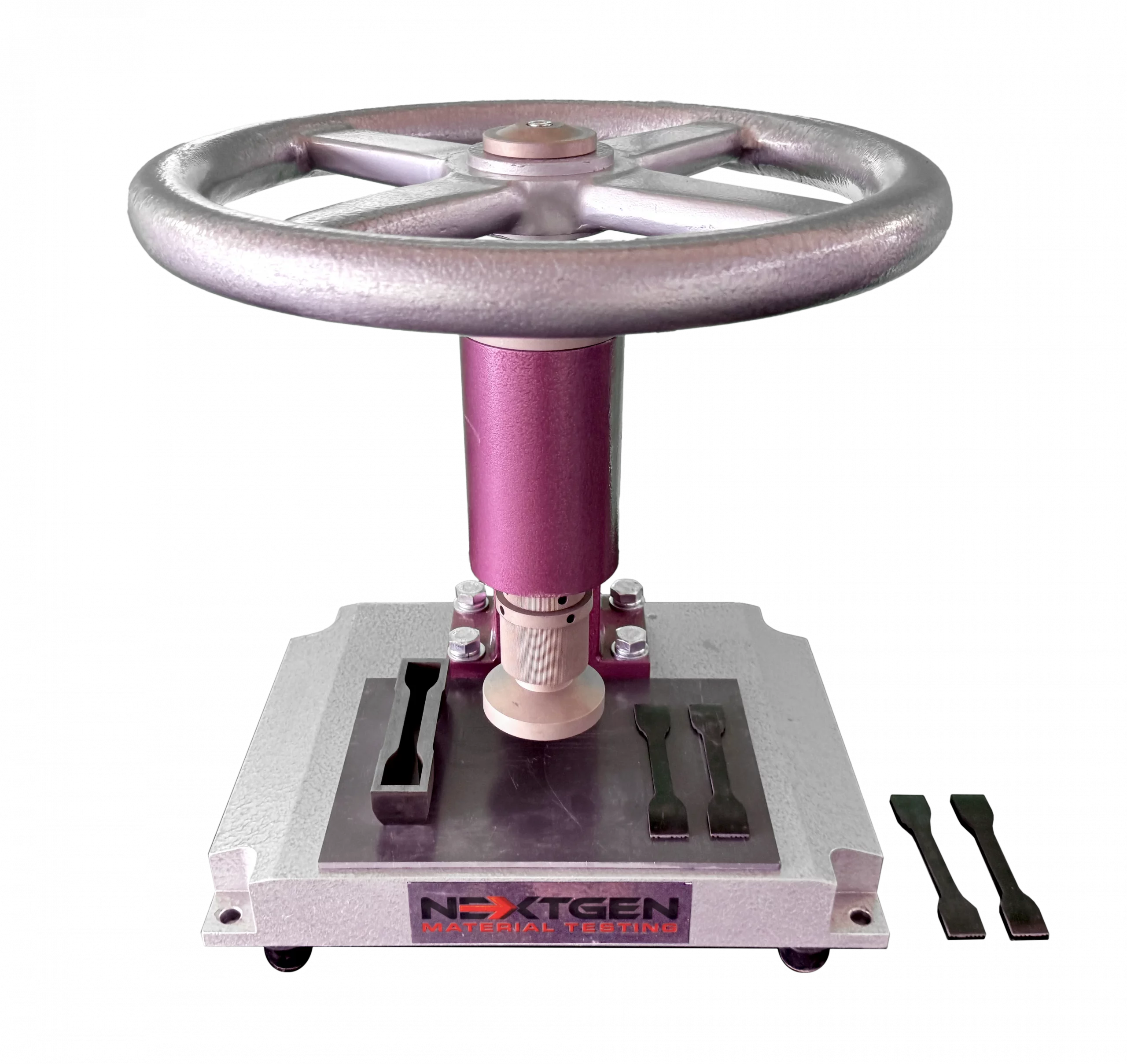
NG-T-Press M Series - Manual Cutting Press System for Rubber Tensile Specimens
Our newest manual cutting press system is suitable for laboratories to create specimens from rubber, tape, and special materials.
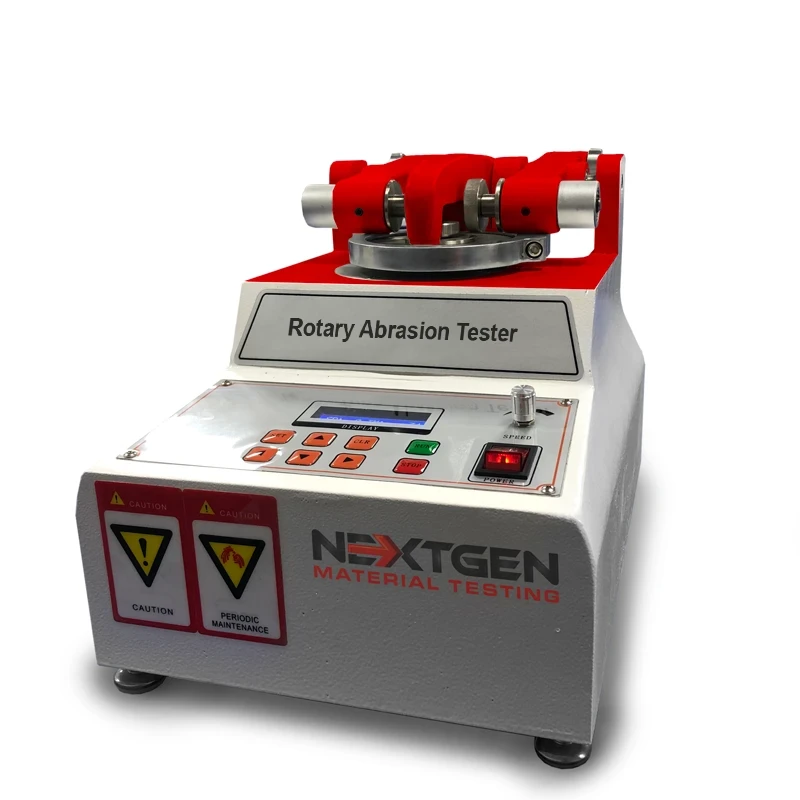
Rotary Abrasion Tester Single & Dual Wheel
GenRotary used evaluate abrasion resistance. It can conduct tests on a wide range of materials such as: cloth, paper, paint, plywood, leather, tile, glass, rubber etc. It tests the specimen by rotating it while in contact with the grinding wheel and applying the required pressure. The Joss of weight reflects on the change in weight of the specimen. The unit also has an intelligent power failure recovery function.
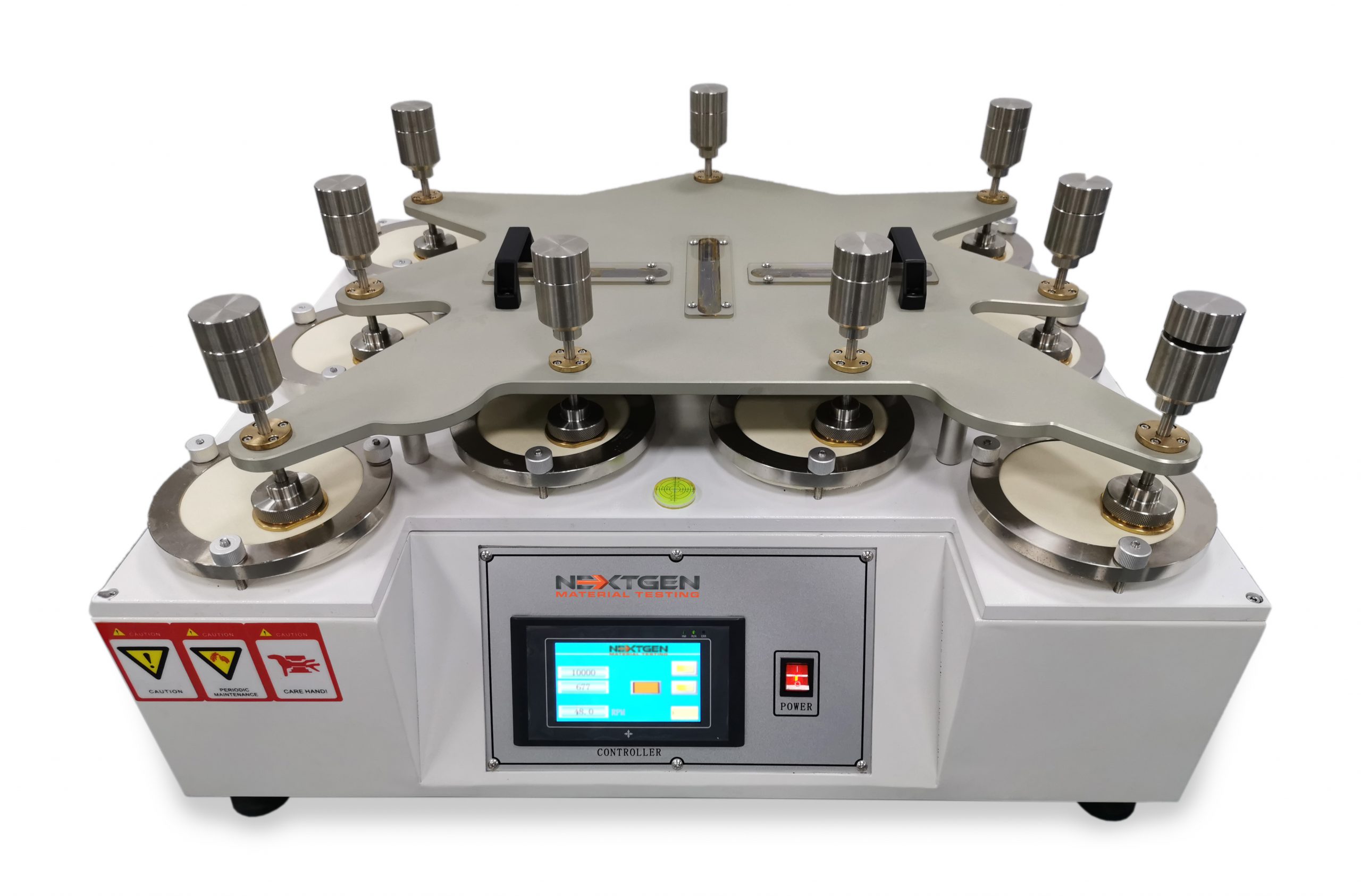
9-Station Martindale Abrasion Tester
The GenDale - Martindale Abrasion Tester is mainly used to test shoe fabric, shoe lining, and many other types of shoe related materials.
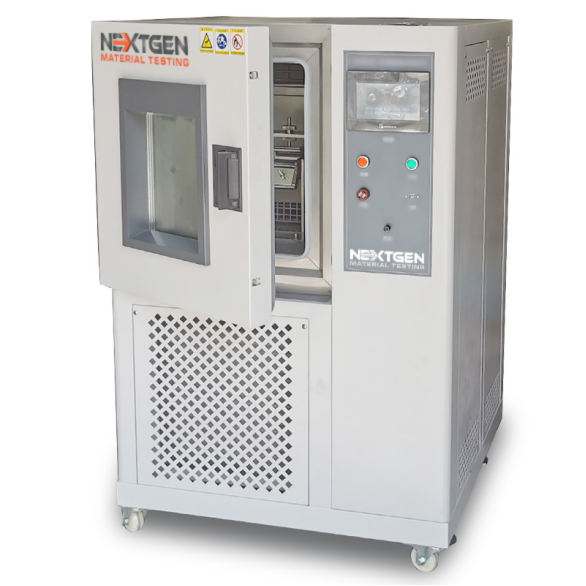
GenRoss-CH - Ross Flex Tester with Low Temperature Chamber
GenRoss-CH is an advanced Ross Flex Tester designed for assessing the cold resistance of materials in low temperature environments.

Linear Abrasion Tester
NextGen's linear abrasion meters evaluate the abrasion and scratch resistance of products, along with color transmission.
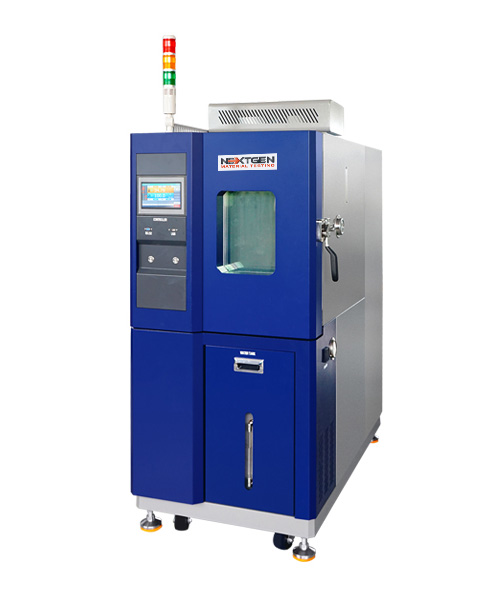
NextGen Environmental Chambers NG-EC 100,150,225,408,1000
The temperature and humidity NextGen Environmental Chambers features a sturdy cabinet made of cold-rolled steel and stainless steel.
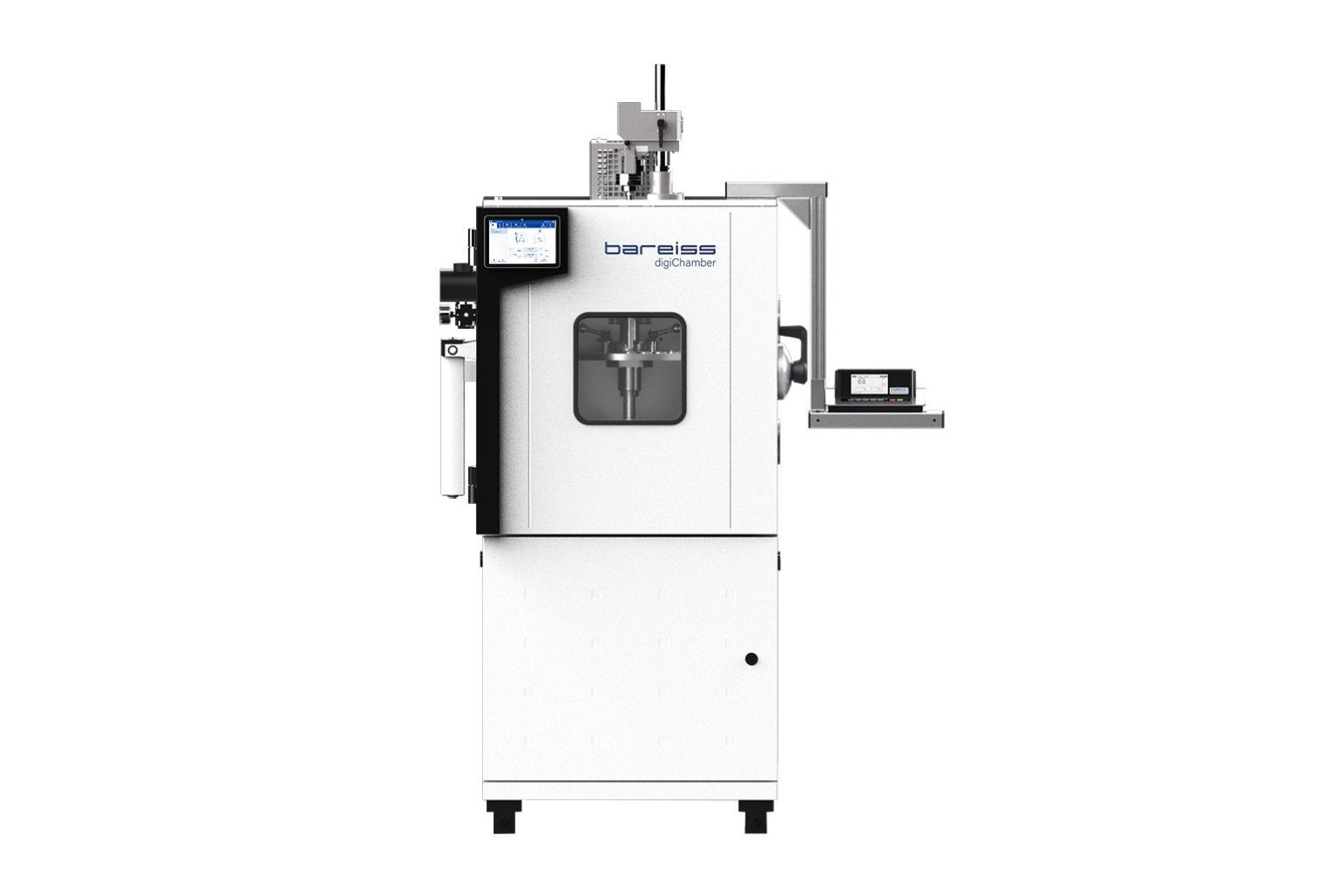
digiChamber - Temperature Controlled Hardness Testing
Discover digiChamber from NextGen Material Testing, the advanced temperature-controlled hardness tester developed by Bareiss.
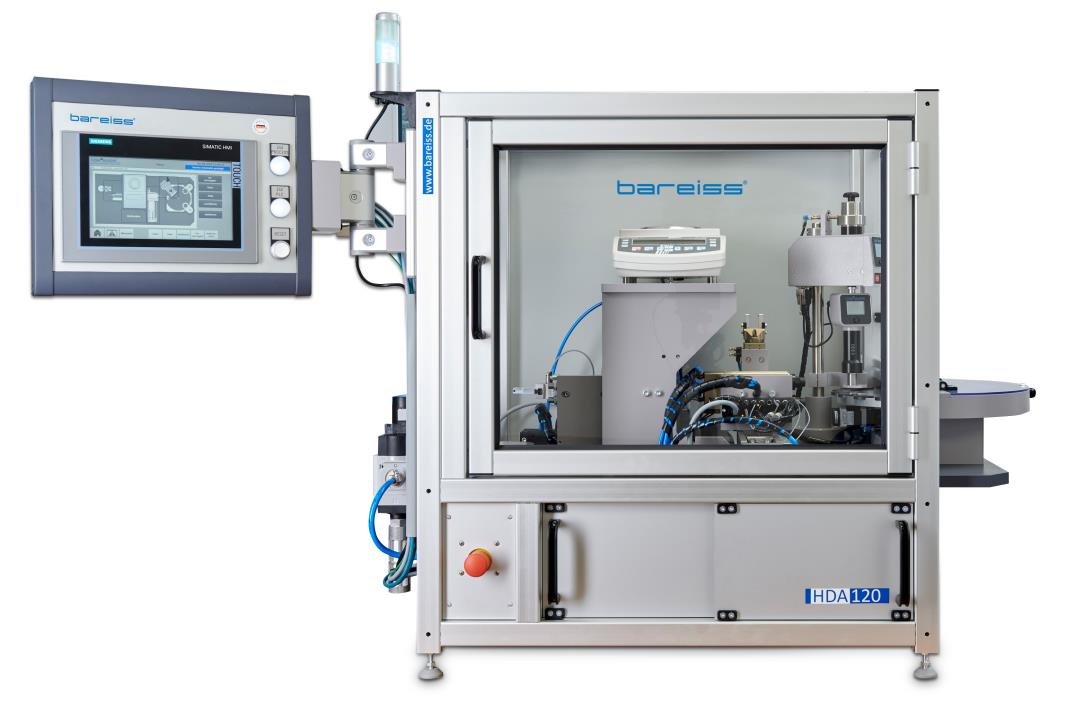
HDA 120 - Hardness and Density Automation Test System
The HDA 120 test system is a versatile solution for semi-automatic detection of sample hardness and density.
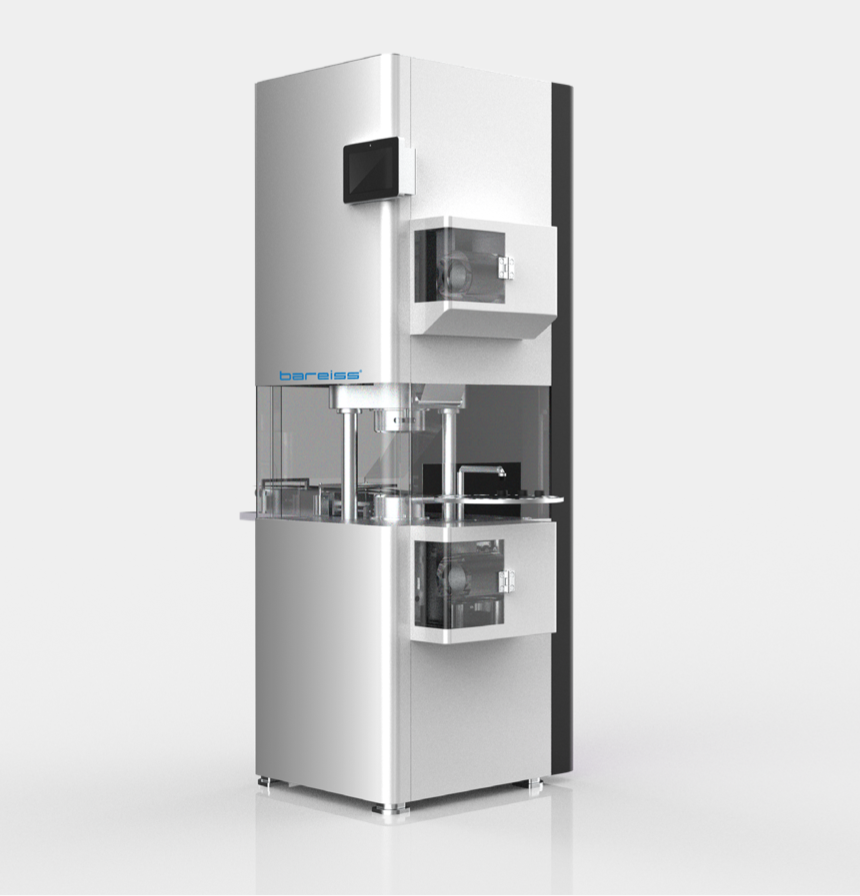
RPA Ultra - Advanced Rubber Process Analyzer Rheometer
RPA Ultra is an advanced rubber process analyzer rheometer that measures the dynamic and static characteristics of raw rubber compounds
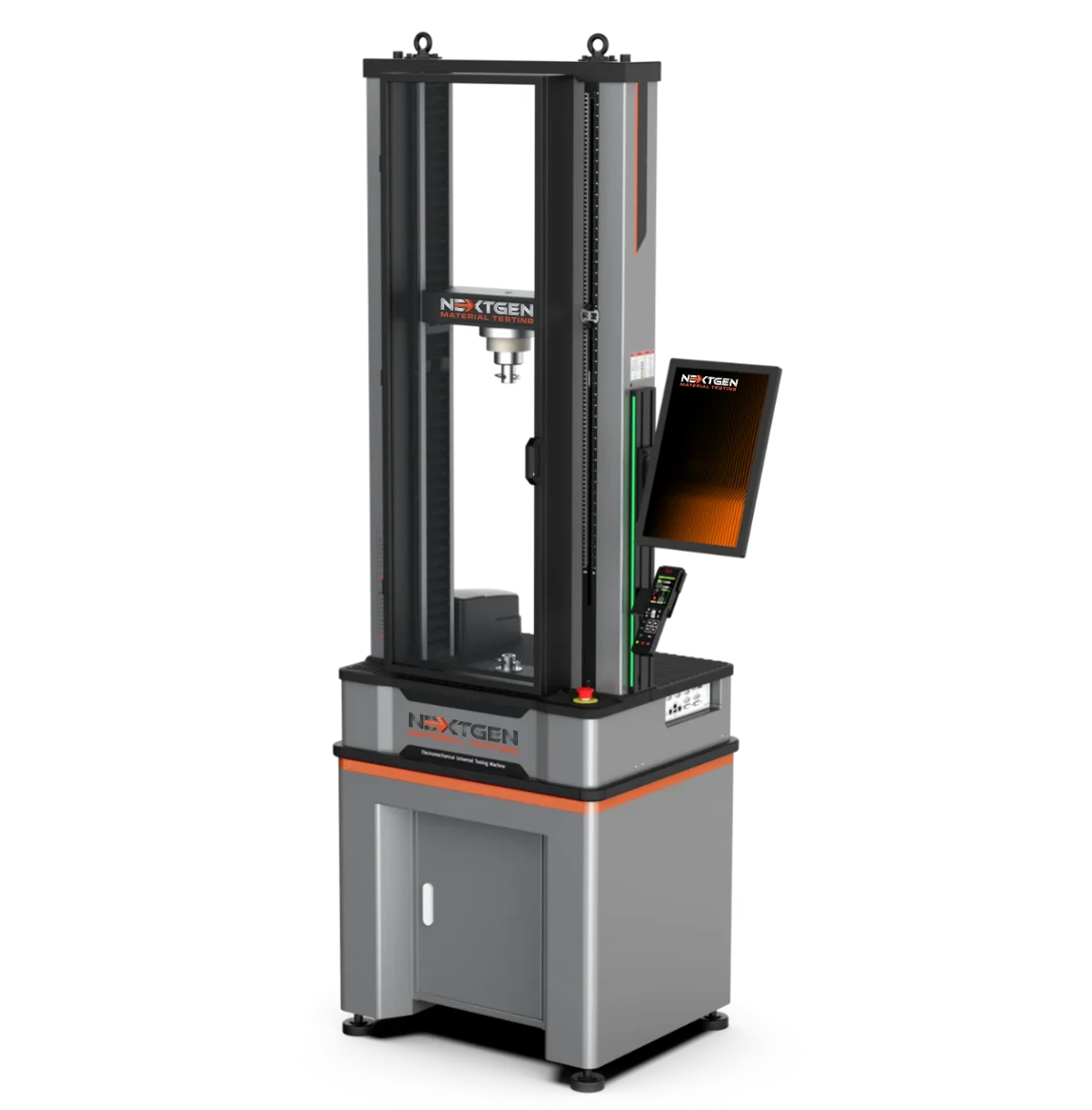
NG-EML Series B – Dual Column Bench Top Universal Testing Machine (100 N – 10 kN)
The NG-EML Series B is a high-precision dual-column benchtop universal testing machine engineered for tensile, compression, and flexural testing in the 0.1 kN to 10 kN range. It features Class 0.5 accuracy, a rigid FEM-optimized frame, and a direct-drive servo system with advanced closed-loop control, making it ideal for testing rubber, plastics, metals, composites, and high-performance polymers in both R&D and quality assurance settings.
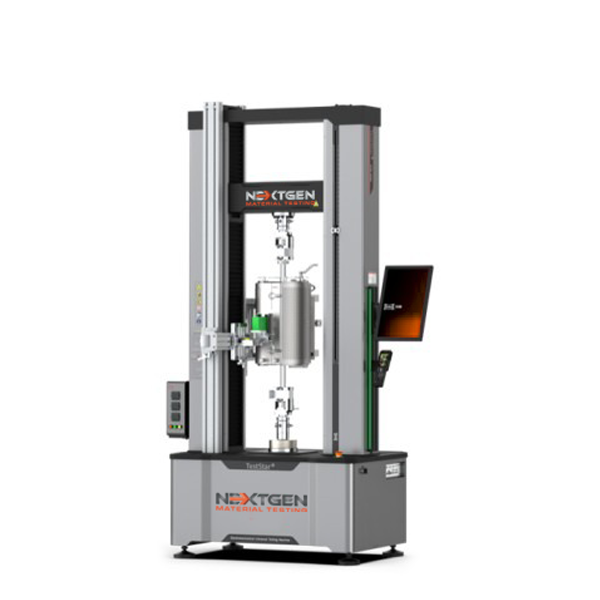
NG-EML Series C – Dual Column Bench Top and Floor Standing Universal Testing Machine (5 kN – 50 kN)
The NG-EML Series C is a precision-engineered dual-column universal testing machine for tension, compression, and flexural testing of metals, composites, rubbers, and polymers. Available in both bench-top and floor-standing formats, with force capacities from 5 kN to 50 kN and Class 0.5 accuracy.
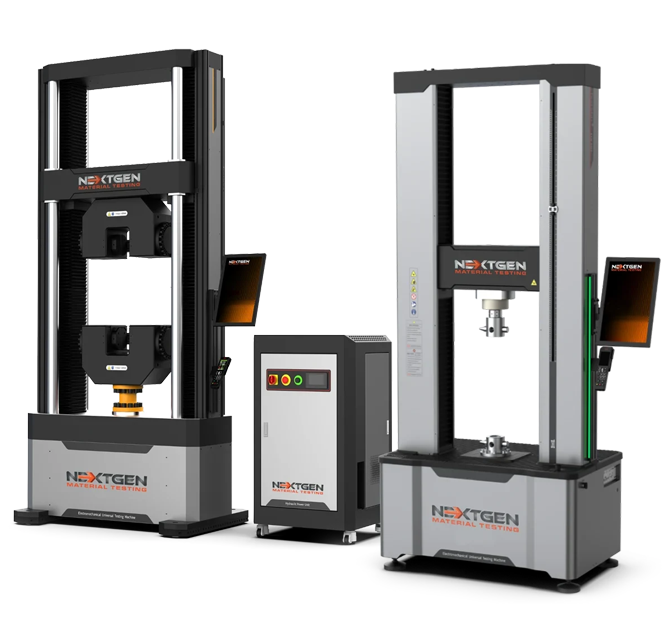
NG-EML Series D – Floor Standing Universal Testing Machine (50 kN – 1000 kN)
The NG-EML Series D – Floor Standing Universal Testing Machine (50 kN–1000 kN) is a dual-column system for tensile, compression, flexural, shear, and cyclic testing of high-strength metals, composites, polymers, and advanced materials. Available in single-space and dual-space configurations, it meets ASTM E8, ISO 6892-1, ISO 527, and GB/T 228 standards. With closed-loop control, 1200 Hz sampling, ultra-low speeds (0.00005 mm/min), and waveform generation, it is ideal for aerospace, automotive, construction, and research labs.
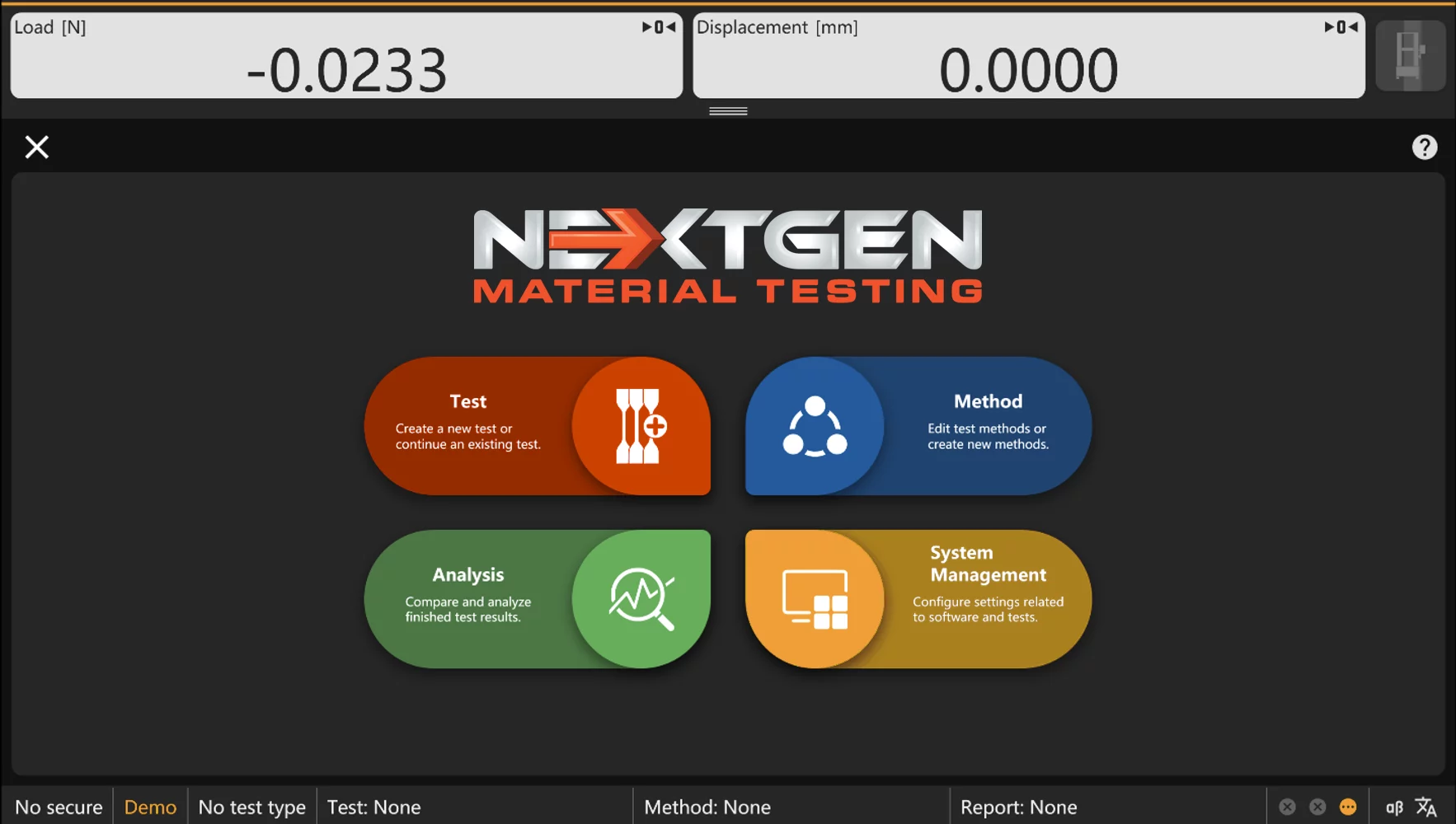
GenTest – Advanced UTM Testing Software
GenTest Software provides test control and data acquisition for universal testing machine workflows used in quality control and materials testing. It combines method templates, step-based sequencing, live curve monitoring, and built-in calculations in one environment. The software supports standards-based testing programs aligned with ASTM, ISO, DIN, EN, and BS. Results and reports remain linked to the method and specimen inputs for consistent review, auditing, and customer documentation.
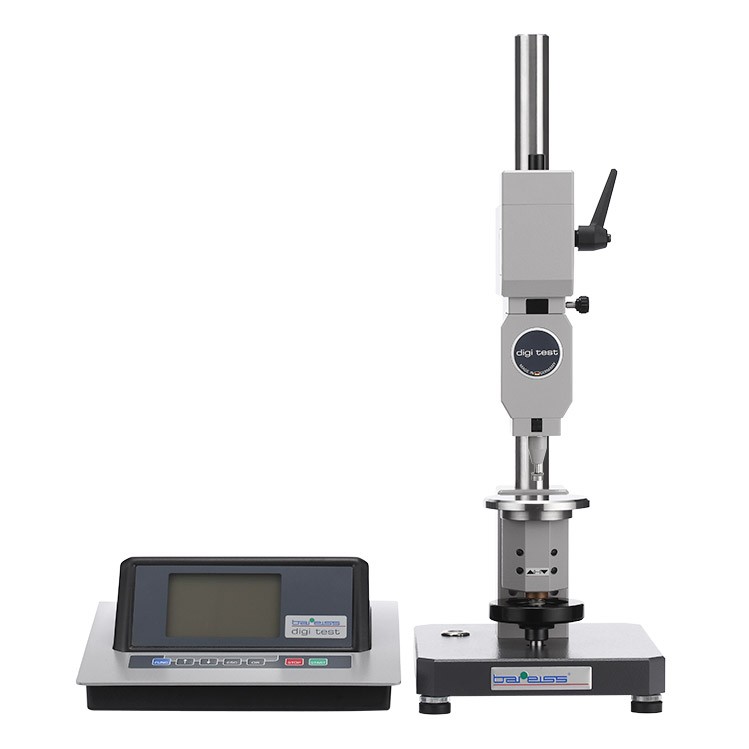
Automatic Shore, IRHD and VLRH Hardness Testing System
NextGen is proud to present our German line of fully-automatic Shore, IRHD and VLRH hardness testing system for plastic materials, plastic and foam compounds for the ultimate precision, accuracy and repeatability, exceptional ease-of-use and maintenance. Experience the industry leader for specimen testing including rubbers, plastics, foams, composites, o-rings, and more.
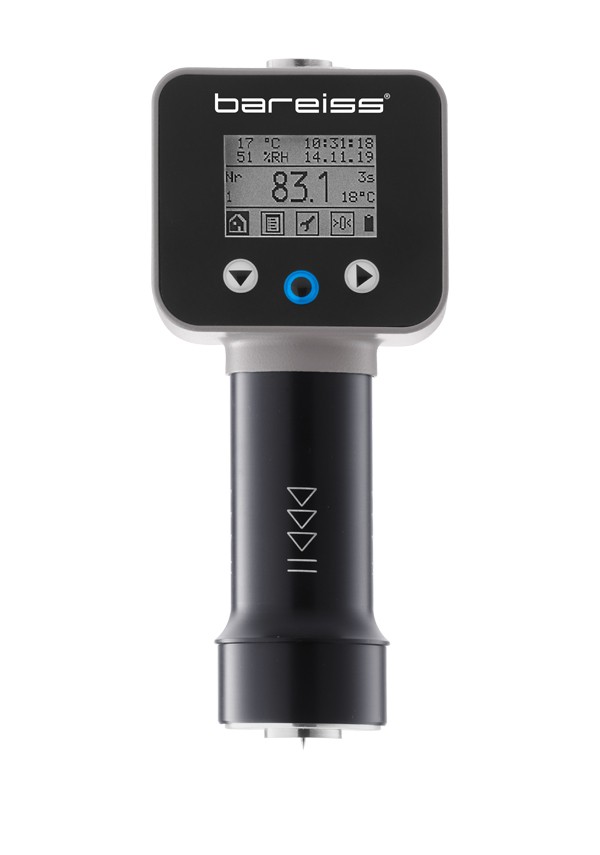
Advanced Portable Shore Durometer System with Test Stand Options
HPEIII is NextGen's advanced German line of equipment that is the new generation of HPE systems ideal for various plastic and plastic compound testing. The new system enhancements offer advantages including temperature sensor, reading values of ambient temperature and humidity, historical hardness value display, larger LCD display, standard USB connection and much more. These advanced portable systems can be paired up with either manual or automatic motorized test stands to help eliminate the human error factor and maximize accuracy and repeatability between test when switching from one operator to the next.
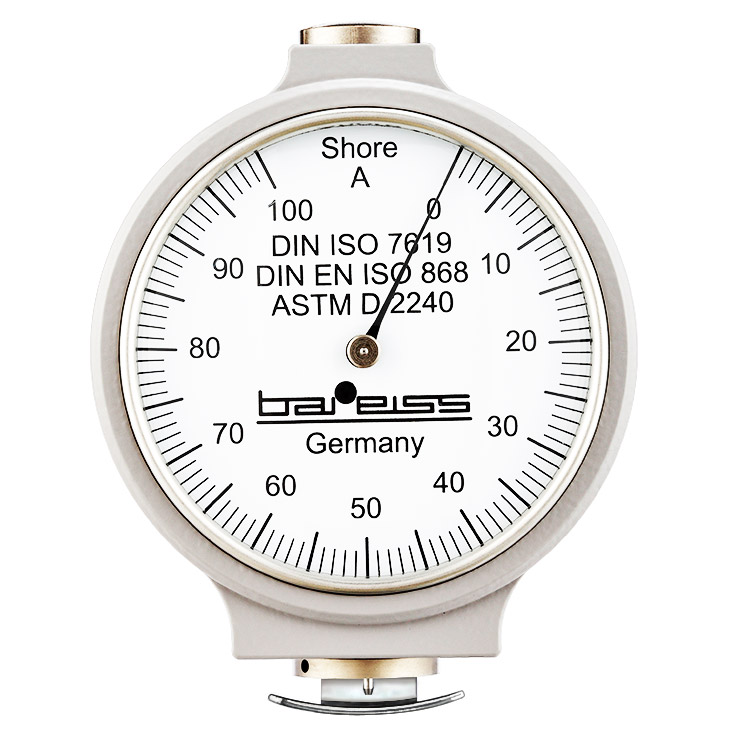
Classic Analogue Shore Durometer with Test Stand Options
This German-manufactured system has been the global benchmark of Shore hardness testing systems since 1954. With ever enhanced ergonomic design, the HP Shore Hardness Tester is both visually appealing and precise rubber and plastic testing system as it has been for nearly 50 years.
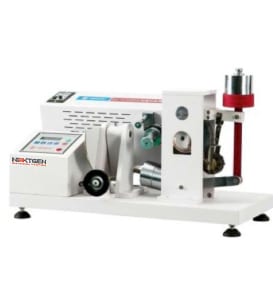
Akron Abrasion Tester
GenKron is used together with a special balance for testing the abrasive consumption of materials. The measurements are done through volumetric loss of a rotating specimen exposed to the action of a standard grinding wheel. It is especially suited for testing harder materials such as shoe soles, tires and other rubber materials.
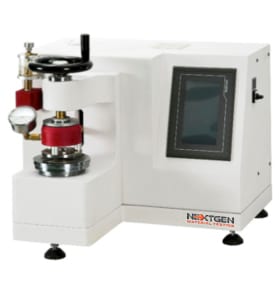
Burst Strength Tester for Fabric
GenBurst is the Burst Strength Tester designed to test anti-rupture strength of variety of materials such as leather, paper and fabric.
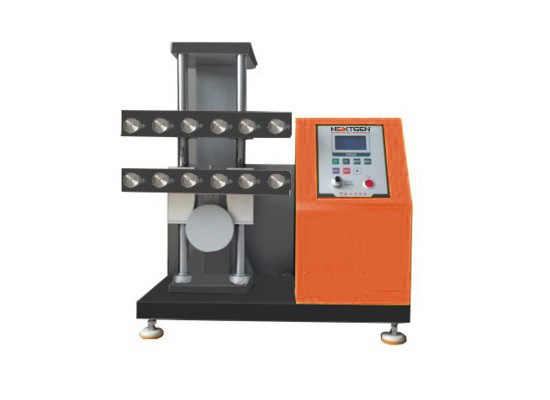
Demattia Flex Cracking Tester
GenFlex tests the ability of rubber products to withstand repeated flexing without developing cracks is of prime importance where such products are used in conditions undergoing repeated flexing. Flexing endurance of rubber products is determined by simulating in laboratory the action of flexing repeatedly under standard conditions of speed, mode, and degree of flexing.
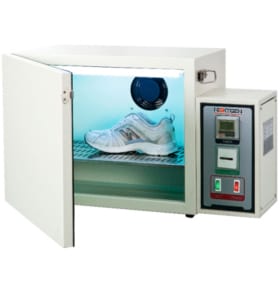
Discoloration Meter
The machine is used to simulate an environment of sunlight radiation on a specimen to identify the resistance of fabric to discoloration.
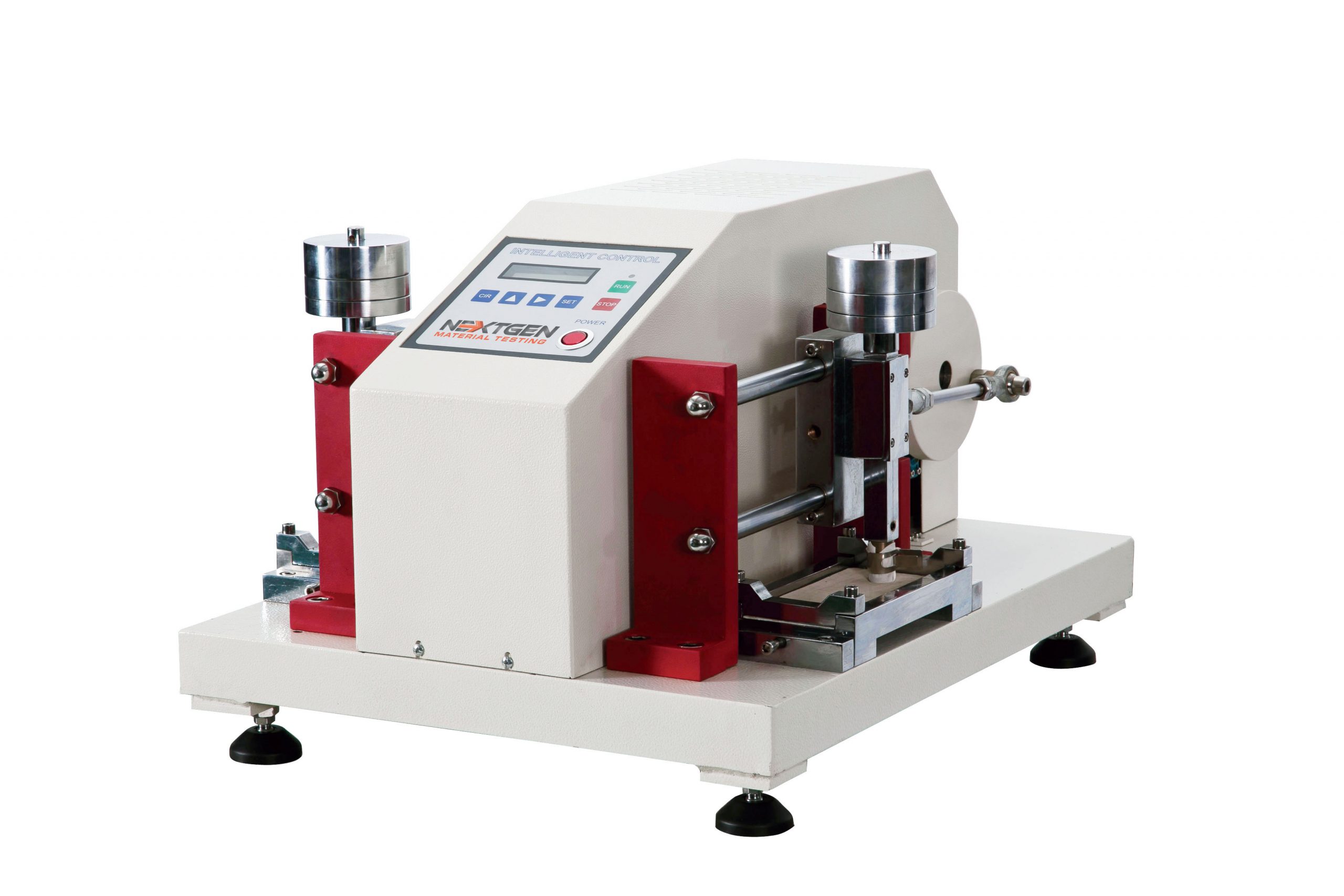
Electric Crocking Tester - GenCrock
The machine is used to test the dyeing of the fabric, and the fade degree of the leather after dry or wet rubbing. The test method involves the specimen to be fastened to the base of the crocking meter and rubbed with an abrasive hammer attached to a wet or a dry cloth under controlled conditions. The transfer of colour is then measured using a scale to evaluate the rating of the specimen's dyeing grade.
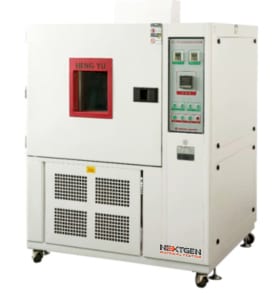
Freezing Tester - GenFreeze
GenFreeze is specially designed to test the characteristics of various materials in a cold environment to ensure suitability for use in a cold climate. Based on the testing demand, adjust the beater and flexing grip, then load to the desired position. It can be used to test rubbers, leather, and plastics, PU leather etc. The unit can be adjusted to meet different requirements.
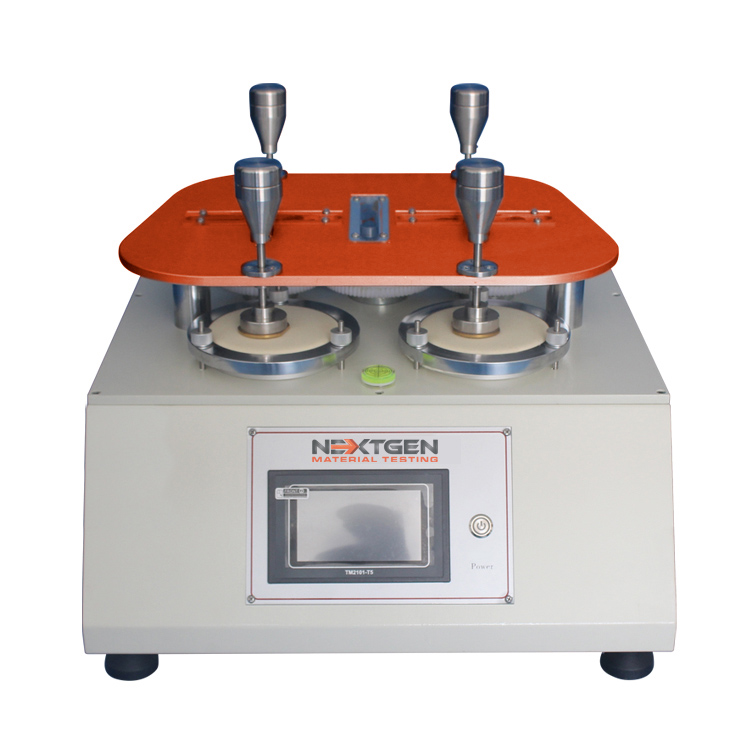
Martindale Abrasion Tester - GenDale
GenDale is mainly used to test shoe fabric, shoe lining, and many other types of shoe related materials. The unit can test up to four specimens at the same time for abrasion. The fabric specimen is measured by having rubbing applied on it via a complex direction of back and forth motion. The accuracy of abrasion strength is determined by the specific number of cycles conducted until a hole appears in the test area of the fabric specimen.
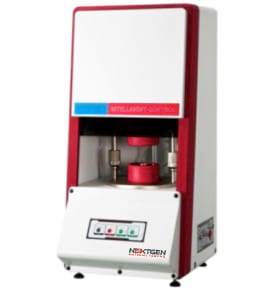
Mooney Viscosity Testing Machine - GenMooney
GenMooney is a viscosity testing machine is applied to measure the viscosity of the unmixed or mixed unvulcanized natural rubber, synthetic rubber and regenerated rubber .This tester has many functions such as fast warming, maintaining temperature, data stability, etc. It is equipped with an automated calibration feature for a simple data calibration of each experiment.
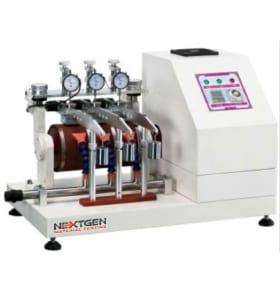
NBS Rubber Abrasion Tester - GenNBS
GenNBS is used to test the abrasion resistance of vulcanized rubber or other rubber compounds. It is commonly used for the soles and heels of footwear. It has an intelligent power failure recovery system. The unit conducts measurements through volumetric loss of specimens exposed to the action of a normalized abrasive medium secured to a rotations cylinder.
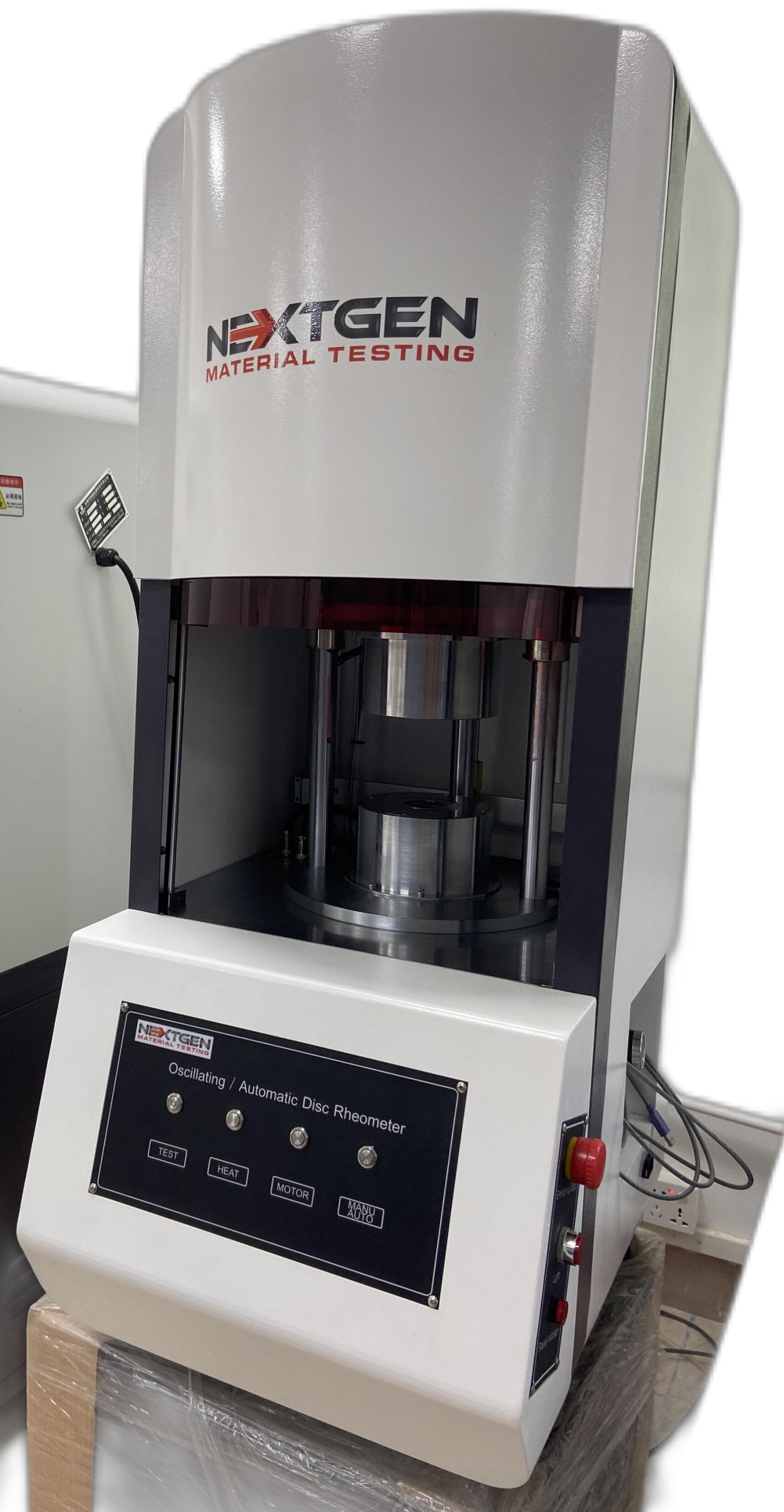
Oscillating / Automatic Disc Rheometer (ODR)
This machine is designed to get the characteristic curve and characteristic parameters of rubber vulcanization by measuring the applied moment of rubber to the oscillating dye body. NG-ODR rotor-free vulcameter has an excellent stability of results. The data and diagrams can be used as a reference for development, research and production quality.

Salt Spray Tester - GenSalt
GenSalt is designed to test the surface of different materials for resistance to corrosion. The unit is commonly used to test coated materials of a metallic nature in a controlled corrosive environment. The test can be used on rust-proof painting, anodizing, electroplating and rust-proof of grease. The machine imitates expedited corrosion process via salt spraying on a given test sample to identify the corrosion (oxides) resistance. Test results are based on the longevity of time a material can resist visible corrosion on the test sample.
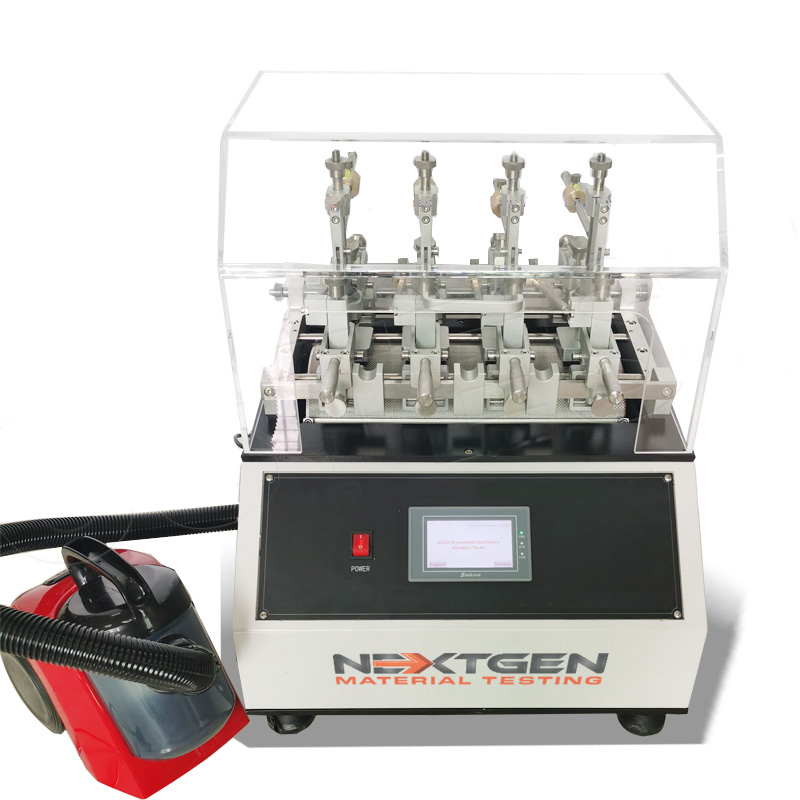
Wyzenbeek Abrasion Tester - GenWyze
The machine is designed to test the abrasion resistance of fabrics and metals. The abrasion of fabrics is tested when the specimen is pulled over the frame and rubbed against an abradant over a curved surface. The number of cycles, also known as double rubs, conducted on the specimen before the fabric shows visible wear is used to determine the rating of abrasion.

Vertical Rebound Resilience Tester - GenRebound
GenRebound tests the resilience of rubber compounds. The machine must be adjusted in a horizontal position and the plunger raised at a specific height. The plunger is then released onto the specimen for a given number of impacts. The measurements are based on the 4th, 5th, and 6th impacts. The average of the three (3) measurements is then calculated for the test result. The machine is highly useful in production of compounds designed to absorb vibration or shock according to the ASTM standards.
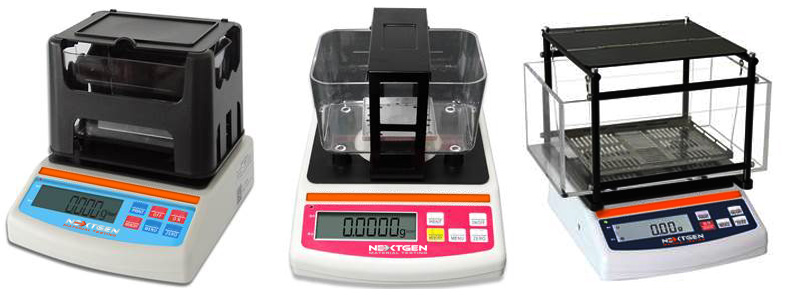
Digital Densimeter Systems
Description The NG-DM-A Series offers high-accuracy digital Densimeters designed for a wide variety of material testing needs. These elegant and compact densimeter systems offer capacity ranges from 150g to 3000g with accuracy of 0.001g/cm3 down to 0.0002g/cm3. Advanced Densimeter System […]
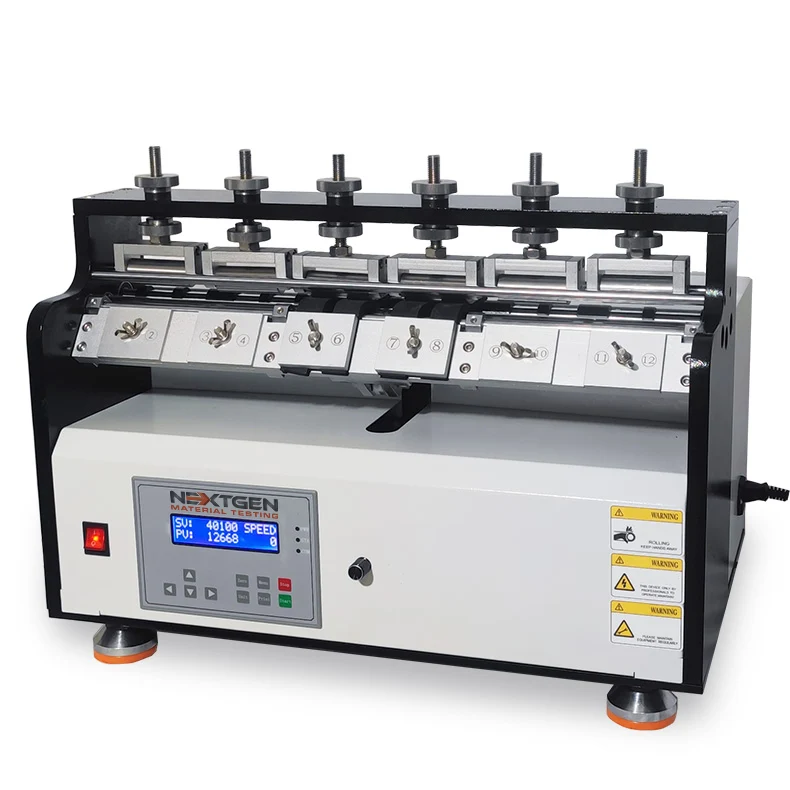
Ross Flex Tester
Ross Flex Tester is designed to determine the resistance of vulcanized or synthetic elastomers to cut growth. The system does so under continuously bend flexing in 90°.
